François de Chateaubriand
Mémoires d’Outre-Tombe
Book XXXV: Arrest, Switzerland, Trial 1832-1833
Translated by A. S. Kline © Copyright 2005 All Rights Reserved
This work may be freely reproduced, stored and transmitted, electronically or otherwise, for any non-commercial purpose. Conditions and Exceptions apply.
Contents
- Book XXXV: Chapter 1: Madame la Duchesse de Berry’s 12000 francs
- Book XXXV: Chapter 2: General Lamarque’s cortege
- Book XXXV: Chapter 3: Madame la Duchesse de Berry goes to Provence and arrives in the Vendée
- Book XXXV: Chapter 4: My arrest
- Book XXXV: Chapter 5: The journey from my thief’s lodging to Mademoiselle Gisquet’s dressing-room – Achille de Harlay
- Book XXXV: Chapter 6: The Examining Magistrate – Monsieur Desmortiers
- Book XXXV: Chapter 7: My life at Monsieur Gisquet’s – I am set at liberty
- Book XXXV: Chapter 8: A letter to the Justice Minister and his reply.
- Book XXXV: Chapter 9: Charles X offers to pay me a Peer’s pension: my response
- Book XXXV: Chapter 10: A note from Madame la Duchesse de Berry – A letter to Béranger – Departure from Paris
- Book XXXV: Chapter 11: Journal from Paris to Lugano
- Book XXXV: Chapter 12: The Saint-Gothard Pass
- Book XXXV: Chapter 13: The Schöllenen Gorge – Devil’s Bridge
- Book XXXV: Chapter 14: The Saint-Gothard
- Book XXXV: Chapter 15: A description of Lugano
- Book XXXV: Chapter 16: The mountains – Trips around Lucerne – Clara Wendel - Peasant prayers
- Book XXXV: Chapter 17: Monsieur Alexandre Dumas – Madame de Colbert – A letter from Monsieur de Béranger
- Book XXXV: Chapter 18: Zurich – Constance – Madame Récamier
- Book XXXV: Chapter 19: Madame la Duchesse de Saint-Leu
- Book XXXV: Chapter 20: Arenenberg – Return to Geneva
- Book XXXV: Chapter 21: Coppet – Madame de Staël’s tomb
- Book XXXV: Chapter 22: A walk
- Book XXXV: Chapter 23: A letter to Prince Louis-Napoleon
- Book XXXV: Chapter 24: A circular to the editors-in-chief of the newspapers – Letters to the Minister of Justice, the President of the Council, and Madame la Duchesse de Berry – I write my Memoir on the Princess’ captivity
- Book XXXV: Chapter 25: Extract from my Memoir on the Captivity of Madame la Duchesse de Berry
- Book XXXV: Chapter 26: My trial
- Book XXXV: Chapter 27: Popularity
Book XXXV: Chapter 1: Madame la Duchesse de Berry’s 12000 francs
Paris, Rue d’Enfer, May 1832.
BkXXXV:Chap1:Sec1
Madame de Berry had her little group of advisers in Paris, as Charles X had his: they received small sums of money in her name to assist poverty-stricken royalists. I proposed to distribute a sum of twelve thousand francs to the cholera victims on behalf of Henri V’s mother. They wrote to Massa, and not only did the Princess approve the distribution of funds, but she wished it could be a more considerable amount: her letter agreeing this arrived on the same day that I sent the money to the mayoralties. Thus, everything I said about the exile’s gift is strictly correct. On the 14th of April I sent the Prefect of the Seine the full amount to be distributed to the poorest section of the population of Paris afflicted by contagion. Monsieur de Bondy was not at the Hotel de Ville when my letter was delivered to him. The Secretary General opened my missive, but did not consider himself authorised to accept the money. Three days passed. Monsieur de Bondy at last replied to me saying that he could not accept the twelve thousand francs because in the guise of charity it was evidently a political device, which the whole population of Paris would protest against, by its refusal. My secretary then approached the twelve district mayors. Of the five mayors present, four accepted the gift of a thousand francs; one refused. Of the seven mayors not present, five maintained their silence: two refused.
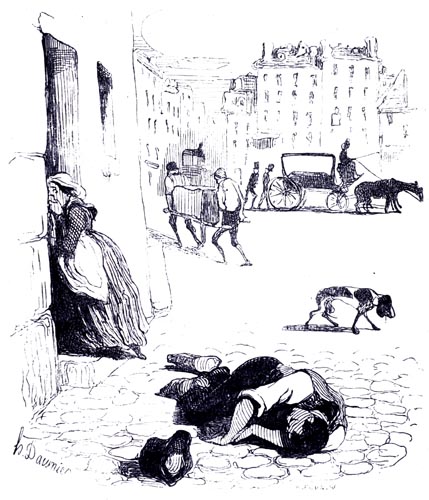
‘Souvenirs du Choléra-Morbus’
Némésis Médicale Illustrée: Recueil de Satires - François Fabre, Honoré Daumier (1840)
Images from the History of Medicine - US National Library of Medicine
I was immediately besieged by an army of indigents: charitable foundations, workers of all kinds, women and children. Italian and Polish exiles, writers, artists, soldiers, all wrote, and all claimed a part of the donation. If I had possessed a million, it would have gone in a few hours. Monsieur de Bondy was wrong in saying that the whole population of Paris would protest by its refusal: the population of Paris will accept money from anyone. The government’s agitation was laughable; one would have thought this treacherous legitimist cash would cause an uprising among the cholera victims, and excite an insurrection of the dying in the hospitals, who would march to assault the Tuileries, beating their coffins, tolling the death-knell, deployed in their shrouds under the command of Death. My correspondence with the mayors was lengthened by the complication caused by the Prefect of Paris’ refusal. Some of them wrote to me to return my money or to ask me for a receipt regarding the return of Madame la Duchess de Berry’s gift. I duly sent them and delivered this acknowledgement to the Mayor of the twelfth district:
‘I have received from the Mayor of the twelfth arrondissement the sum of one thousand francs which he had previously accepted and which he has returned to me by order of the Prefect of the Seine.
Paris, this 22nd of April 1832.’
The Mayor of the ninth district, Monsieur Cronier, was more courageous: he kept the thousand francs and was relieved of his duties. I wrote him this note:
‘29th of April 1832.
Sir,
I learn with distress of your dismissal, of which Madame la Duchesse de Berry’s gift was the cause, or for which it was the pretext. You have for consolation the public’s esteem, your feelings of independence and the knowledge of your self-sacrifice in the victims’ cause.
I have the honour, etc, etc.’
The Mayor of the fourth district was quite another sort: Monsieur Cadet de Gassicourt, the poet-pharmacist, maker of little verses, creating in his age, the age of liberty and Empire, a pleasantly classical statement opposing my romantic prose and that of Madame de Staël, was the hero who took by assault the cross from above the porch of Saint-Germain-l’Auxerrois, and who, in a proclamation regarding the cholera, stated that the wicked Carlists may well have been those who poisoned the wine, to whom the people had already meted out justice. The illustrious champion then wrote me the following letter:
‘Paris, the 18th of March 1832.
Sir,
I was absent from the city hall when the person you sent presented himself: that will explain my delay in replying.
Monsieur le Préfet de la Seine, having refused to accept the money which you were charged with offering him, seems to me to have laid down the mode of conduct which the Members of the Municipal Council should adopt. I follow Monsieur le Préfet’s example even more strongly in that I believe in and share entirely the sentiments which led him to refuse.
I will merely mention in passing the title Royal Highness bestowed with affection on the person of whom you are appointed agent: the daughter-in-law of Charles X is no more a Royal Highness in France, than her father-in-law is king! Yet, Sir, there is no one who is not morally convinced that this lady is an active agitator, and expends sums much more considerable than those she has trusted you to employ, in stirring up trouble in our country and instigating civil war. The alms which she has the pretension to bestow are merely a means of attracting attention to herself and her party and are a kindness which her intentions are far from justifying. You will not find it strange then that a magistrate firmly attached to the constitutional monarchy of Louis-Philippe should refuse help which comes from such a source, and will find, among true citizens, purer acts of generosity addressed with sincerity to humanity and our country.
I am, with the greatest respect, Sir, etc.
F. CADET DE GASSICOURT.’
This attack of Monsieur Cadet de Gassicourt’s on the lady and her father-in-law displays great pride: what progress enlightenment and philosophy have made! What an invincible show of independence! Messieurs Fleurant and Purgon would only have dared gaze at people on their knees; to them, Monsieur Cadet says like the Cid: Let us rise then! His liberty is all the more courageous in that this father-in-law (otherwise a descendant of Saint Louis) is proscribed. Monsieur de Gassicourt is above all that; he scorns the nobility and the misfortunes of the age equally. It is with the same disdain for aristocratic prejudices that he misses out my de in addressing me, and takes it as a victory over the gentry. Yet, was there not some ancient rivalry, some ancient historic dispute between the House of Cadet and the House of Capet?
Henri IV, ancestor of this father-in-law who is no more king than the lady is a Royal Highness, was traversing the forest of Saint-Germain one day; eight Leaguers lay in ambush to murder the Béarnais; they were seized. ‘One of these gallants,’ says L’Estoile, ‘was an apothecary who demanded to speak to the King, and on His Majesty enquiring of what rank he was, he replied that he was an apothecary. “What!” said the King, “is there a rank of apothecary round here? Do you lie in wait for passers-by to give them enemas?”’ Henri IV was a soldier, immodest speech scarcely bothered him, and he no more retreated from a word than from an enemy.
I suspect Monsieur de Gassicourt, given his ill-humour towards Henri IV’s descendant, of being a descendant of that pharmacist Leaguer. The Mayor of the fourth district no doubt wrote to me in the hope that I would cross swords with him; but I do not wish to do battle with Monsieur Cadet: may he forgive me for leaving him a little mark of my remembrance here.
Since those days when I witnessed great revolutions and great revolutionaries, everything has shrivelled. Men who toppled an oak tree, too old to take root if replanted, addressed themselves to me; they demanded a few pounds from the widow in order to buy bread; this letter from the Committee for the July Medal-Winners is a useful document to note for future reference.
‘Paris, the 20th of April 1832.
RSVP, to Monsieur Gibert-Arnaud, Managing-Secretary of the Committee, 3 Rue Saint-Nicaise.
Monsieur le Vicomte,
The Members of our Committee write in confidence to ask you if you would honour them with a gift for the July medal-winners, unfortunate family men; in this time of plague and misery, your kindness would inspire the most sincere gratitude. We dare to hope that you will consent to set your illustrious name beside those of Messieurs le General Bertrand, General Exelmans, General Lamarque, General Lafayette, various Ambassadors, Peers of France, and Deputies.
We beg you to honour us with a word in reply, and if, contrary to our hopes, a refusal follows our request, be good enough to return this note to us.
With the purest of sentiments we beg you, Monsieur le Vicomte, to accept the homage of our respective greetings.
The active Members of the Committee for the July Medal-Winners:
Visiting Member: Faure.
Special Commissioner: Cyprien-Desmaret.
Managing-Secretary: Gibert-Arnaud.
Assistant Member: Tourel.’
I took care not to relinquish the advantage that the July Revolution here granted me over itself. In distinguishing between people, it had created islands of unfortunates, who, because of certain political opinions, were not to be helped. I quickly sent the gentlemen a hundred francs, with this note:
‘Paris, this 22nd of April 1832.
Gentlemen,
I thank you deeply for contacting me with regard to my coming to the aid of various unfortunate family men. I hasten to send you the sum of one hundred francs; I regret not having a more substantial gift to offer.
I have the honour, etc.
CHATEAUBRIAND.’
The following receipt was sent to me immediately:
‘Monsieur le Vicomte,
I have the honour to thank you and to acknowledge receipt of one hundred francs which you kindly destine for relief of the July unfortunates.
Salutations and respect.
The Managing-Secretary of the Committee:
GIBERT-ARNAUD.
23rd of April.’
Thus, Madame la Duchesse de Berry gave alms to those who had pursued her. These transactions lay bare the heart of things. Consider the reality of a country where no one cares for their party’s casualties, where the heroes of yesterday are cast adrift tomorrow, where a little gold attracts a crowd, as farmyard pigeons flock to the hand that throws them grain.
Four thousand francs of the twelve thousand remained. I addressed myself to religion; Monsignor the Archbishop of Paris wrote me this noble letter:
‘Paris, the 26th of April 1832.
Monsieur le Vicomte,
Charity like faith is catholic, a stranger to human passions, independent of their politics: one of the primary characteristics which distinguish it, according to St Paul, is to think no evil: non cogitate malum. She blesses the hand that gives and the hand that receives, without attributing to the generous benefactor any motive other than that of doing a good deed, and without asking from the poor sufferer any condition other than need. She accepts with profound and heart-felt thanks the gift that the august widow has charged you with conferring on her, for the relief of our unfortunate brothers who are victims of the scourge which has afflicted the capital.
She will distribute the four thousand francs you have give me for her with faithful care, and this letter is a fresh receipt, but I will have the honour to inform you of the details of the distribution when the benefactress’ intentions have been fulfilled.
Monsieur le Vicomte, please convey to the Duchesse de Berry the gratitude of a shepherd and father who offers his life to God, every day, on behalf of his lambs and his children, and who calls to everyone for aid sufficient to meet their needs, Her royal heart has doubtless already found within herself recompense for the sacrifice she has made for our unfortunates; religion assures her moreover of the efficacy of the divine promise committed to delivering blessings upon those who show mercy.
A distribution has been carried out immediately among the priests of the twelve main parishes of Paris, to whom I am addressing the letter of which I here enclose a copy.
Accept, Monsieur le Vicomte, the assurance, etc.
Hyacinthe, Archbishop of Paris.’
It is always wonderful to see how religion creates its own style, and gives even to commonplaces a gravity and propriety which one feels at once. It contrasts with the tone of those anonymous letters which were mingled with the letters I have just cited. The orthography of these anonymous letters is correct enough, the writing fine; they are, properly speaking, literary, like the July Revolution. They show the jealousies, hatreds and vanities of hacks protected by the inviolability of a cowardliness which never showing its face cannot be revealed by a slap.
SAMPLES
‘Tell us when you grease your moccasins, you old Republican! We can easily find you some Chouan grease, and some of your friends’ blood to write their history with if you like, there’s plenty in the Paris mud, it’s their element.
Ask your rascally and worthy friend Fitz-james, Old Brigand, if the stone he received in the feudal cause gave him pleasure. You pile of scoundrels, we’ll rip your guts out, etc, etc.’
In another missive, can be seen a neatly draw gallows with these words:
‘Get on your knees to a priest, and make contrition, as we want your old head to end its treason.’
Anyway, the cholera is still with us: the reply I might send a known, or unknown, adversary might perhaps arrive when he was dying at the threshold of his house. If on the other hand he was destined to live, where would his reply reach me? Perhaps in that place of rest which no one fears these days, above all we whose lives span the Terror, and the Plague, the first and last of our life’s horizons. Enough: let the coffins go by.
Book XXXV: Chapter 2: General Lamarque’s cortege
Paris, Rue d’Enfer, 10th of June 1832.
BkXXXV:Chap2:Sec1
General Lamarque’s cortege lead to two blood-stained days and the victory of the Quasi-Legitimacy over the Republican Party. The latter, fragmented and disunited, carried out a heroic resistance.
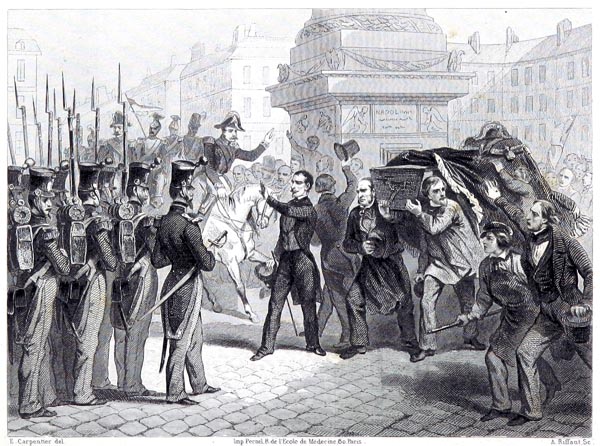
‘Convoi du Général Lamarque’
Le Dernier Roi - Alexandre Dumas (p446, 1854)
The British Library
Paris was placed in a state of siege: it was censure on the largest possible scale, censure in the style of the Convention, with this difference that a military commission replaced the revolutionary tribunal. In June 1832 they shot the men who brought them victory in July 1830; they sacrificed that same École Polytechnique, that same artillery of the National Guard, who had conquered the powers that be, on behalf of those who now struck at them, disavowed them and cast them off! The Republicans were certainly wrong to have espoused the methods of anarchy and disorder; but should we not rather have deployed such noble arms on our frontiers? They would have delivered us from the yoke of the stranger. Generous and exalted spirits would not thereby have remained in Paris fermenting trouble, inflamed by our shameful foreign policy and the disloyalty of our new monarchy. You have shown no mercy, you who, without sharing the dangers of the Three Days, reaped the rewards. Go, with their mothers, now, and seek the bodies of those medal-winners of July, whose positions, wealth and honours you have taken. You, our young men, have met differing fates on the same shore! You possess both tombs beneath the colonnade of the Louvre and places in the Morgue; some for having seized, others for having granted a crown. Who knows your names, you makers of sacrifice and you victims, forever unknown, of a memorable revolution? Who remembers those whose blood cements the monuments men admire? The workers who built the Great Pyramid, to hold the body of an inglorious pharaoh, sleep forgotten in the sand, among the sparse roots that nourished them during their labour.
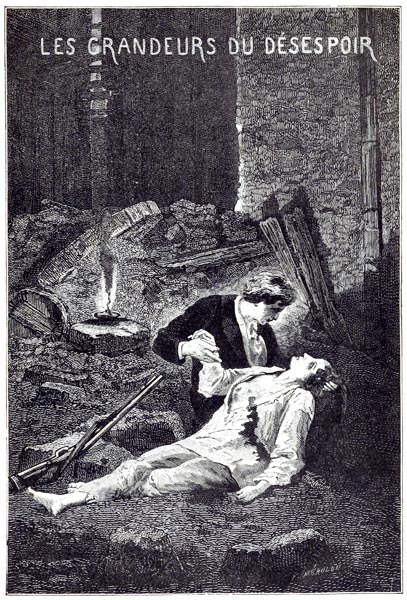
‘Les Grandeurs de Désespoir, A. de Neuville (Les Misérables p381 vol. 05)’
Cent Dessins: Extraits des Oeuvres de Victor Hugo: Album Specimen - Victor Hugo (p98, 1800)
Internet Archive Book Images
Book XXXV: Chapter 3: Madame la Duchesse de Berry goes to Provence and arrives in the Vendée
Paris, Rue d’Enfer, the end of July 1832.
BkXXXV:Chap3:Sec1
Madame la Duchesse de Berry had no sooner sanctioned the expenditure of her 12000 francs than she embarked on her notorious adventure. An attempt to rouse Marseilles failed; only the West remained open to an attempt: but the glory of the Vendée is another thing; it lives on in the splendour of our history, yet nine tenths of France chose a different glory, the object of jealousy and antipathy; the Vendée is an Oriflamme, venerated and admired, in the treasury of Saint-Denis, beneath which youth and the future no longer range themselves.
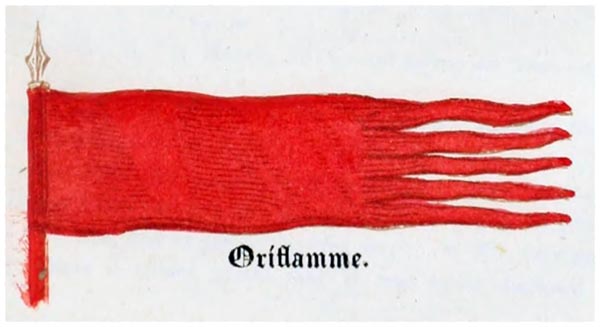
‘Oriflamme’
History of the Battle of Agincourt, and of the Expedition of Henry the Fifth into France in 1415 - Sir Nicholas Harris Nicolas (p146, 1833)
Internet Archive Book Images
Madame, disembarking like Bonaparte, on the coast of Provence, saw no white banners flying from steeple to steeple: deceived in her expectations, she found herself almost alone with Monsieur de Bourmont in the field. The Marshal wanted her to cross the frontier again immediately; she asked for a night to consider; she slept well on the cliffs to the sound of the sea; on waking in the morning she pursued a noble dream with the thought: ‘Since I am on French soil, I will not leave: let us go to the Vendée.’ Monsieur de Villeneuve-Bargemont, warned by a loyal follower, took her in his carriage with his wife, crossed the whole of France, and deposited her at Montaigu, where she stayed for a while, in a château, without being recognised except by a priest of the place; Marshal Bourmont was to rejoin her in the Vendée, by another route.
Informed of all this in Paris, it was easy for us to foresee the result. The enterprise presented another problem for the royalists; it would reveal the weakness of their cause and dispel illusions. If Madame had not gone to the Vendée, France would have continued to think there was, in the West, a Royalist force-in-waiting, as I dubbed it.
But there was still, in the end, a means of rescuing Madame and casting a fresh veil over the reality: the Princess must leave immediately; meeting with danger and peril, like a brave general reviewing an army, tempering impatience and ardour, she could have declared that she had hastened there to tell the soldiers that the time for action was not yet favourable, and that she would return to place herself at their head when the occasion demanded. Madame would at least have shown the inhabitants of the Vendée a Bourbon for once; the shades of Cathelineau, d’Elbée, Bonchamp, La Rochejaquelein, and Charette would have rejoiced.
Our committee assembled; while we were in discussion, a captain arrived from Nantes who told us where our heroine was staying. The captain was a fine young man, tough as a sailor, a Breton original. He disapproved of the enterprise; he thought it was foolish; but he said: ‘If Madame does not leave, it will prove mortal and that’s that; then, gentlemen of the council, you may hang Walter Scott, it will be he who is the guilty party.’ I was advised to write and inform the Princess of this sentiment. Monsieur Berryer, who was arranging to go to Vannes to plead a case, generously proposed to carry the letter and see Madame if he could. When it became necessary to pen the note, no one cared to write it: I took on the task.
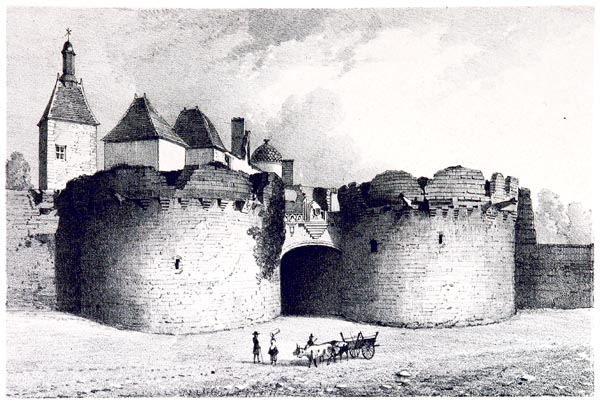
‘Le Château d'Ancenis, Nantes’
Histoire d'Ancenis et de ses Barons - Em Maillard (p221, 1860)
The British Library
Our messenger left, and we waited on events. I soon received the following letter, by post, which had not been concealed and had doubtless passed beneath the eyes of the authorities:
‘Angoulême, the 7th of June.’
Monsieur le Vicomte,
I had received and transmitted your letter of last Friday, when on Sunday the Prefect of the Lower Loire invited me to leave Nantes. I was en route and at the gates of Angoulême; I have just been brought before the Prefect who has informed me of an order of Monsieur de Montalivet’s which requires me to be taken back to Nantes under police escort. Since my departure from Nantes, the department of the Lower Loire is in a state of siege: by this illegal action they are subjecting me to the laws of ‘exception’. I have written to the Minister asking him to have me summoned to Paris; he has my letter by this courier. The aim of my journey to Nantes seems to have been completely misinterpreted. Judge whether in your prudence it would be appropriate to speak to the Minister. I ask your pardon for making this request of you; since I can address no one but you.
Believe, Monsieur le Vicomte, in my sincere and lasting attachment, as in my profound respect.
Your devoted servant,
BERRYER THE YOUNGER.
P. S. – There is no time to be lost if you wish to see the Minister. I am on my way to Tours, where his fresh orders would find me on Sunday; he could transmit them by telegraph or despatch rider.’
I informed Monsieur Berryer, in this reply, of the action I had taken:
‘Paris, the 10th of June 1832.
Sir, I have received your letter dated from Angoulême on the 7th of this month. It was too late to see the Minister of the Interior, as you would have wished me to; but I wrote to him immediately and passed him your letter enclosed with mine. I hope that the mistake which has led to your arrest will soon be acknowledged, and that you will be returned to freedom and your friends, among whom I beg to be included. A thousand compliments to you, and a fresh assurance of my sincere and complete devotion.
CHATEAUBRIAND.’
This was my letter to the Minister of the Interior:
‘I have just received the enclosed letter. As it is likely that I will be unable to see you as swiftly as Monsieur Berryer desires, I have adopted the course of sending you his letter. His summons seems right to me: he will be as innocent in Paris as at Nantes; the authorities will acknowledge this, and will, by allowing Monsieur de Berryer’s recall, avoid applying the law retrospectively. I dare to rely totally, Monsieur le Comte, on your impartiality.
I have the honour, etc, etc.
CHATEAUBRIAND.’
Book XXXV: Chapter 4: My arrest
Paris, Rue d’Enfer, the end of July 1832.
BkXXXV:Chap4:Sec1
An old Scottish friend of mine, Mr Frisell, had just lost his only daughter, of seventeen, at Passy. On the 15th of June I went to the funeral of poor Élisa, whose portrait pretty Madame Delessert was finishing when death set there the last mark of the brush. Returning to my solitude, in the Rue d’Enfer, I retired to bed full of melancholy thoughts arising from the conjunction of youth, beauty and the grave. On the 16th of June, at four in the morning, Baptiste, who had been many years in my service, approached my bed and said: ‘Sir, the courtyard is full of men placed at all the doors who forced Desbrosses to open the wicket, and there are three gentlemen who wish to speak to you.’ As he finished speaking, the gentlemen entered, and their leader, very politely approaching my bed told me he had orders to arrest me and take me to the Police Prefecture. I asked him if the sun had yet risen, as the law required, and if he carried a legal order: he did not reply in regard to the sun, but he showed me the following document:
Copy:
‘PREFECTURE OF POLICE.
By command of the King;
We, a Councillor of State, and Prefect of Police,
Acting on information received;
In virtue of Article 10 of the Criminal Code;
Require the Superintendent, or another if he is unavailable, to go to Monsieur le Vicomte de Chateaubriand’s, or anywhere else as needs be, to prevent a plot against the State, with the aim of making of a search there and seizing all papers, correspondence, and writings containing incitements to crime or offences against the public peace, where open to examination, as well as all seditious objects or weapons which he may possess.’
While I was reading this declaration of a great plot against the security of the State, of which little I was accused, the police chief said to his subordinates: ‘Gentlemen, do your duty!’ These gentlemen’s duty was to open all the cupboards, to rummage in all my pockets, to seize all my papers, letters and documents, to read them, if they could, and discover all weapons, as required by the terms of the aforesaid order.
After a reading of the document, I addressed myself to the respectable leader of these takers of men and freedom: ‘You know, Sir, that I do not recognise your government, and that I protest against the violence done to me; but as I am not the stronger and have no desire to grapple with you, I will get up and follow you: have the goodness, I beg you, to take a seat.’
I dressed, and taking nothing with me, I said to the venerable Superintendent: ‘Sir, I am at your disposal: are we going on foot? – No, Sir, I have taken the trouble to get you a cab. – That is very good of you: Sir, let us depart; but allow me to say goodbye to Madame de Chateaubriand. Will you allow me to go into my wife’s room alone? – Sir, I will accompany you to the door and wait for you there – Very well, Sir.’ And we descended.
In the street, there were sentries everywhere; they had even placed a cavalry picket on the boulevard, at a little door which opened onto the end of my garden. I said to their chief: ‘These precautions were quite useless; I have not the least intention of fleeing you and escaping.’ The gentlemen had jumbled my papers but not taken anything. My great Mameluke sabre caught their attention; they talked in low voices and ended by leaving the weapon under a heap of dusty folios, in the midst of which lay a crucifix of yellow wood which I had brought from the Holy Land.
This pantomime would have almost roused me to laughter, but I was cruelly tormented in regard of Madame de Chateaubriand. Whoever knows her, also knows the tenderness she shows towards me, her fears, the liveliness of her imagination and the wretched state of her health; the police swoop and my arrest must have given her a great shock. She had already heard the noise and I found her sitting on her bed, listening in fear, when I entered her room at that extraordinary hour.
‘Oh, dear God!’ she cried: ‘are you ill? Oh, dear God, what is it? What is it?’ And she took to trembling. I embraced her, barely restraining my tears, and said: ‘It is nothing, they have sent for me to take my statement as a witness to some business concerning a censorship trial. It will all be finished in a few hours, and I will return to dine with you.’
The agent had remained by the open door; he saw this scene, and as I placed myself in his hands once more, I said: ‘You see, Sir, the effects of your morning visit.’ I crossed the courtyard with my escort; three of them climbed into the cab with me, the rest of the squad accompanied the prisoner on foot and we arrived without delay in the courtyard of the Prefecture of Police.
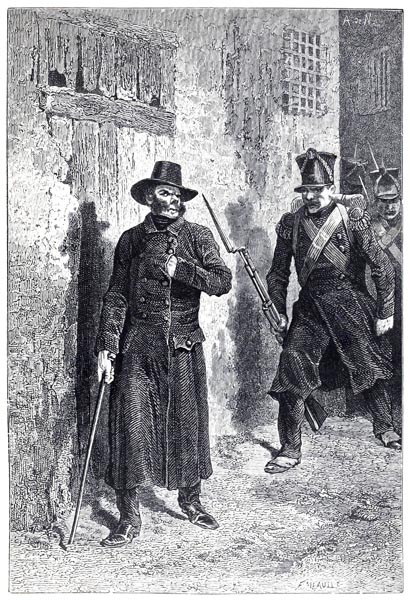
‘Javert a la poursite de Jean Valjean et de Cosette, A. de Neuville (Les Misérables p217 vol. 02)’
Cent Dessins: Extraits des Oeuvres de Victor Hugo: Album Specimen - Victor Hugo (p82, 1800)
Internet Archive Book Images
The gaoler who ought to have admitted me to a holding cell was not up yet; they woke him by knocking on his wicket, and he went off to prepare my residence. While he was occupied with his work, I walked to and fro in the yard with Monsieur Léotaud who was guarding me. He spoke to me amicably, since he was very honest, saying: ‘Monsieur le Vicomte, it is a great honour to meet you; I presented arms before you several times when you were a Minister and you came to see the King: I served in the Bodyguards: but there it is! I have a wife and children; one must live! – You are right, Monsieur Leotard: how much does it bring in? – Ah! Monsieur le Vicomte, that depends on the prisoners. There are bonuses, sometimes good, sometimes poor, as in war.’
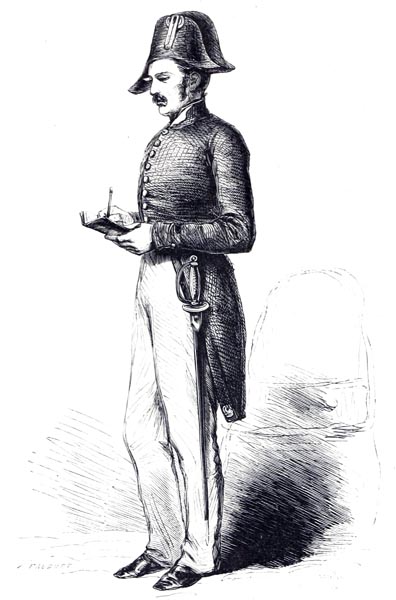
‘Le Sergent de Ville’
Les Français Peints par Eux-Mêmes (p761, 1853)
Internet Archive Book Images
During my stroll, I saw agents in various disguises like maskers on Ash Wednesday on the slopes of the Courtille: they came to give their account of their deeds during the night. Some were dressed as greengrocers, street criers, coal vendors, market porters, traders in second-hand clothes, rag and bone men, and organ-grinders; others were wearing wigs, from beneath which poked hair of a different colour; others had beards, moustaches and false sideburns; others limped along as respectable cripples wearing a bright red ribbon in their buttonholes. They vanished into a little courtyard, and soon re-appeared in different costume, without moustaches, beards, sideburns, wigs, baskets, wooden legs, and arms in slings; this whole flock of police birds flew off at dawn and vanished with the rising sun. My cell was ready, the gaoler came to tell us so, and Monsieur Léotaud, doffing his hat, led me to the door of my honest lodging and, as he left me in the hands of the gaoler and his helpers, said: ‘Monsieur le Vicomte, I have been honoured in welcoming you: till we meet again.’ The door closed behind me. Preceded by the gaoler who carried the keys and his two lads who followed me to prevent me turning back, I reached the second floor by a narrow stairway. A dark little corridor led me to a door; the keeper opened it: I followed him into my cell. He asked me if I needed anything: I replied that I would like breakfast in an hour. He advised me there was a kitchen which furnished prisoners with all they could wish, at a price. I asked my gaoler to have me sent some tea, and if possible, hot and cold water and napkins. I gave him twenty francs in advance: he withdrew respectfully promising to return.
Left alone, I inspected my prison: it was a little longer than it was wide, and its height was seven or eight feet. The walls, discoloured and bare, were sprinkled with prose and verse by my predecessors and especially with scribbles by a woman who gave the ‘Centre Ground’ plenty of abuse. A pallet with dirty sheets occupied half the lodging; a plank, supported by two wooden brackets, set against the wall, two feet above the bed, served as a wardrobe for the detainee’s linen, boots and shoes; a chair and a vile appurtenance comprised the rest of the furnishings.
My faithful guard brought me the napkins and jugs of water I had asked for; I begged him to take away the dirty sheets, the blanket of yellow wool, to remove the bucket whose smell was choking me, and to sweep out my cell after swilling it down. All the works of the ‘Centre Ground’ having departed, I shaved; I washed myself with water from my jug, and changed my linen, Madame de Chateaubriand having given me a small supply; I laid out all my possessions on the plank above the bed, as in a cabin on board ship. When that was done, my breakfast arrived and I took my tea at my well-scrubbed table which I covered with a white napkin. Someone arrived shortly to remove the utensils from my morning feast and left me alone duly imprisoned.
My cell was lit only by a window-grill which opened at a height; I placed my table beneath this grill and climbed on the table to get some air and enjoy the light. Through the bars of my thief’s cage I could see a courtyard or rather a narrow shadowy passage, the darkened buildings around it aquiver with bats. I heard the clinking of keys and chains, the sound of policemen and spies, the tread of soldiers, the movement of weapons, shouts, laughter, the wild songs of my fellow prisoners, curses from Benoît, condemned to death for murdering his mother and his lover. I distinguished these words of Benoit’s among his confused cries of fear and repentance: ‘Oh My mother, my poor mother!’ I saw the reverse side of society, the pleas of humanity, and the hideous machines that move the world.
I thank the men of letters, the great partisans of freedom of the Press, who formerly took me as their leader and fought under my command; without them, I would ended my life without knowing what prison was like, and would have missed the experience. I recognise in that delicate attention the genius, goodness, generosity, honour and bravery of the leading writers. But after all, what did this brief trial amount to? Tasso spent years in a dungeon, yet I complain! No; I have not the pride or foolishness to compare my few hours of discomfort with the lengthy sacrifices of those immortal victims whose names history has preserved.
Moreover, I was not at all unhappy; the spirit of greatness past and a glory thirty years old never troubled me; but my Muse of yesteryear, all poor and unknown, came shining to embrace me through the window: she was charmed by my residence and inspired; she found me as she had seen me in my London poverty, when the first idea of René entered my mind. What should we create, that solitary from Pindus and I? A song on the lines of that of the unfortunate poet Lovelace who, in the prisons of the English Commonwealth, sang of King Charles I, his master? No; a prisoner’s voice would have seemed a poor augury for my little King Henri V: hymns to misfortune should be addressed from the foot of the altar. So I did not sing of the crown fallen from an innocent brow; I contented myself with speaking of another crown, also pale, placed on a young girl’s coffin; I remembered Élisa Frisell, whose funeral I had seen the previous day in Passy cemetery. I began some elegiac verses of a Latin epitaph; but then the correct quantity of a word baffled me; quickly I leapt down from the table on which I had been perched, leaning against the bars of the window, and ran to the door on which I beat heavily. The caverns round about echoed; the terrified gaoler ascended followed by two gendarmes; he opened my wicket and I shouted as Santeuil would have done: ‘A Gradus! A Gradus!’ The gaoler stared wide-eyed, the gendarmes thought I was revealing the name of one of my accomplices; they would willingly have handcuffed me; I explained; I gave them money to buy the book, and they went off to ask a Gradus ad Parnassum of the astonished police.
While they were occupied with my commission, I climbed on my table again, and inspired afresh by my tripod, I set to composing verses for Elisa; but in the midst of my inspired flight, about three o’clock, here came the bailiffs into my cell and apprehended my body on the banks of Permessus: they led me before the examining magistrate who drew up his documents in an obscure office, facing my gaol, on the other side of the courtyard. The magistrate, a young robe, well-fed and conceited, asked me the usual questions as to my name, forenames, age, and place of residence. I refused to reply or sign anything, not recognising the political authority of a government which had on its side neither hereditary right nor popular election, since France had not been consulted and there had been no gathering of any national congress. I was led back to my cell.
At six they brought me my dinner, and I continued to work and re-work the lines of my stanzas in my head, improvising at the same time an air which seemed to me to be quite charming. Madame de Chateaubriand sent me a mattress, bolster, sheets, a cotton blanket, candles and the books I like to read at night. I made my bed singing all the while:
The coffin is lowered, the roses without stain,
My romance of the sweet girl and the sweet flower composed itself:
The coffin is lowered, the roses without stain
A father placed there, a tribute to his grief;
Earth, you bore them, hide them now, again,
Sweet girl, sweet flower.
Oh! Do not return them to this world of pain,
This world, profane, of sorrow and despair;
Wind will wither them; sun will make them fade,
Sweet girl, sweet flower.
You sleep, my poor Élisa, so tender of years,
No longer burdened by the heat of day!
You discover a fresher morning here,
Sweet girl, sweet flower.
But Élisa, your father bends towards your grave;
From your brow to his the pallor ascends.
Old oak tree! ...Time uproots the strong and brave,
Sweet girl, sweet flower!
Book XXXV: Chapter 5: The journey from my thief’s lodging to Mademoiselle Gisquet’s dressing-room – Achille de Harlay
Paris, Rue d’Enfer, the end of July 1832.
BkXXXV:Chap5:Sec1
I began to undress; the sound of voices was heard; my door opened and the Prefect of Police accompanied by Monsieur Nay, appeared. He made me a thousand excuses for the length of my detention at the station; he informed me that my friends, the Duke of Fitz-James and Baron Hyde de Neuville had been arrested as I had and that, with the log-jam in the Prefecture, no one knew where the people with whom justice was occupied had been placed. ‘But,’ he added, ‘you must come home with me, Monsieur le Vicomte, and choose which room will best suit you.’
I thanked him and begged him to leave me in my hole; I was already quite charmed by it, as if it were a monk’s cell. The Prefect refused my entreaties and was forced to unearth me. I saw those rooms again which I had not seen since the day when Bonaparte’s Prefect of Police had asked me to visit so he could invite me to leave Paris. Monsieur and Madame Gisquet opened up all their rooms while begging me to say which one I would occupy. Monsieur Nay proposed to yield me his. I was embarrassed by so much politeness; I accepted a little out-of-the-way room looking onto the garden and which, I think, served as a dressing room for Mademoiselle Gisquet; I was allowed to retain my servant who slept on a mattress outside my door, at the entrance to a narrow stairway down to Madame Gisquet’s grand apartment. Another stairway led to the garden; but the latter was forbidden me, and every evening a sentry was posted below by the railing separating the garden from the quay. Madame Gisquet is the nicest woman on earth, and Mademoiselle Gisquet is very pretty and a very competent musician. I had nothing but praise for my hosts’ care: they seemed to wish to recompense me for the twelve hours of my initial imprisonment.
The morning after my taking up residence in Mademoiselle Gisquet’s dressing room, I rose quite contented, remembering Anacreon’s poem on the young Greek girl; I stuck my head out of the window: I could see a little garden, full of greenery, and a high wall hidden by Japanese lacquer-work; on the right, at the end of the garden, were offices where pleasant clerks of the police service could be glimpsed, like lovely nymphs among the lilacs; on the left, the banks of the Seine, the river, and an ancient corner of Paris, in the parish of Saint-André-des-Arts. The sound of Mademoiselle Gisquet’s piano reached me mixed with the voices of agents asking for the divisional heads in order to make their reports.
How the whole world changes! This little romantic English garden assigned to the police was a tiny winding fragment of the French garden, its arbours closely pruned, that belonged to the first President of the Parliament of Paris. This ancient garden occupied the site of that parcel of houses which limits the view to the north and west, and extended to the banks of the Seine. It was here after the day of the barricades, that the Duc de Guise came to visit Achille de Harlay: ‘He found the first President walking in his garden, who was so little astonished by his arrival that he deigned neither to turn his head nor discontinue the walk he had begun, which being achieved, and he being at the end of the path, he returned, and on returning saw the Duc de Guise advancing towards him; then that grave magistrate, raising his voice, said: ‘It is a great pity that the valet has chased his master away; as for the rest, my soul is God’s, my heart is my King’s, and my body is in the hands of rogues; let them do what they will.’ The Achille d’Harlay who walks in the garden today is Monsieur Vidocq, and the Duc de Guise is Coco Lacour; we have exchanged great men for great principles. How free we are these days! Above all how free I was at my window, witness the fine gendarme at the foot of my stairs who was ready to shoot me in flight if I had spread my wings! There were no nightingales in my garden, but there were plenty of lively sparrows, cheeky and quarrelsome, found everywhere, in town and country, palaces and prisons, perching as cheerfully on the instruments of death as on a rose-bush: to those who can fly, what do the sufferings of the earth matter!
Book XXXV: Chapter 6: The Examining Magistrate – Monsieur Desmortiers
Paris, Rue d’Enfer, the end of July 1832.
BkXXXV:Chap6:Sec1
Madame de Chateaubriand obtained permission to see me. She had spent three months, during the Terror, in prison at Rennes with my two sisters Lucile and Julie; her imagination, still sensitive to it, could not bear the idea of prison. My poor wife had a violent attack of nerves on entering the Prefecture, and that was one more thing for which I was obliged to the ‘Centre Ground’. On my second day of detention, the examining magistrate, Monsieur Desmortiers, arrived accompanied by his clerk.
Monsieur Guizot had named a certain Monsieur Hello as public prosecutor as the Royal Court of Rennes, a writer and hence envious and irritable as all are who scribble on paper in a victorious cause.
Monsieur Guizot’s protégé, finding my name and that of Monsieur Hyde de Neuville mixed up in the trial he was pursuing at Nantes against Monsieur Berryer, wrote to the Minister of Justice, saying that if he were in charge, he would lose no time in arresting us and including us in the trial, both as accomplices and exhibits. Monsieur de Montalivet thought he should bow to Monsieur Hello’s advice; there had been a time when Monsieur de Montalivet had come to my house, humbly, to seek my advice and ideas on the elections and the freedom of the Press. The Restoration, which made a Peer of Monsieur de Montalivet, could not make a man of him, and that is no doubt why it sickens him these days.
Monsieur Desmortiers, the examining magistrate, thus entered my little chamber; his sugary manner hid, like a layer of honey, a tense and violent face.
‘My name it is Loyal, I come from Normandy,
And I’m Sergeant of the Rod, despite your enmity.’
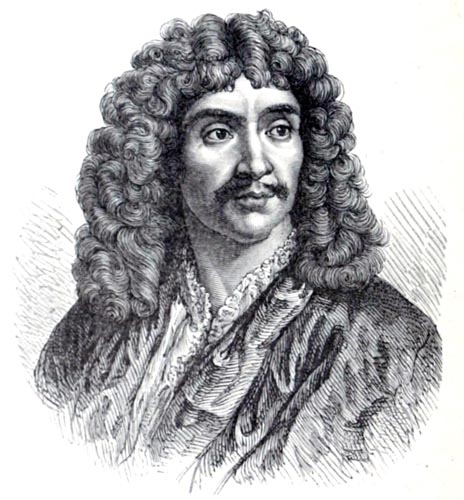
‘Molière’
Zigzag Journeys in Europe: Vacation Rambles in Historic Lands - Hezekiah Butterworth (p321, 1880)
Internet Archive Book Images
Monsieur Desmortiers was formerly of the congregation, a great communicant, a great legitimist, a great partisan of the decrees, and became a fanatical supporter of the Centre Ground. I begged this creature to take a seat with all the politeness of the ancien régime; I pulled up an armchair for him; I placed a little table before his clerk, with pen and ink on it; I sat facing Monsieur Desmortiers, and he, in a benign voice, read me the petty accusations which, duly proven, would have tenderly cut my throat: after which, he began his interrogation.
I declared once more that, as I did not recognise the existing political order, I had nothing to say, that I would sign nothing, that all this judicial process was superfluous, that they could spare themselves the effort and go; that, as for the rest, I was always charmed to receive Monsieur Desmortiers. (I set an initial example in refusing to recognize the judges which several Republicans have since followed. Note: Paris, 1840)
I saw that this manner of proceeding enraged the saintly man, who, having once shared my opinions, found my conduct made a mockery of his own; to this resentment was added the pride of a magistrate who thinks he is blessed by his function. He wished to argue with me; I could never have made him comprehend the difference between the social order and the political order. I would submit, I explained to him, to the former, since it represents natural law; I would obey civil, military and financial laws and those of the police and public order; but I owed no allegiance to political laws except in as much as they derived from Royal authority consecrated by the centuries, or from the sovereignty of the people. I was not stupid enough or devious enough to believe that the nation had been summoned, or consulted, and that the political order established had been the result of a national decision. If I were put on trial for theft, murder, arson or other social crimes and offences, I would respond to justice; but since a political process had been started against me, I had nothing to say to an authority which had no legal power, and in consequence, nothing to demand of me.
A fortnight passed away in this manner. Monsieur Desmortiers, whose fury I detected (a fury which he tried to communicate to the judges), tackled me with a confiding air, saying: ‘So you will not even tell me your illustrious name?’ During one of his interrogations, he read me a letter from Charles X to the Duke of Fitz-James, in which there was a phrase honouring myself. ‘Well, Sir,’ I said, ‘what does this letter signify? It is widely known that I remain loyal to my former King, and that I did not take the oath to Philippe. Apart from that, I am deeply moved by this letter of my exiled sovereign’s. In the course of his prosperity, he never said anything similar to me, and that sentence rewards me for all my efforts.’
Book XXXV: Chapter 7: My life at Monsieur Gisquet’s – I am set at liberty
Paris, Rue d’Enfer, the end of July 1832.
BkXXXV:Chap7:Sec1
Madame Récamier, to whom so many prisoners have owed consolation and deliverance, was brought to my new retreat. Monsieur de Béranger came over from Passy to tell me in song, during his friends’ rule, what it was like to be in gaol during that of mine: he could not have thrown the Restoration in my face more harshly. My great friend Monsieur Bertin came to administer the ministerial sacraments; an enthusiastic lady hastened from Beauvais in order to admire my glory; Monsieur Villemain performed a courageous action; Monsieur Dubois, Monsieur Ampère, Monsieur Lenormant, my wise and generous young friends, did not forget me; the Republican defence lawyer, Monsieur Charles Ledru, did not forsake me: in hopes of a trial, he exaggerated the affair, and would have foregone all his fees to have had the pleasure of defending me.
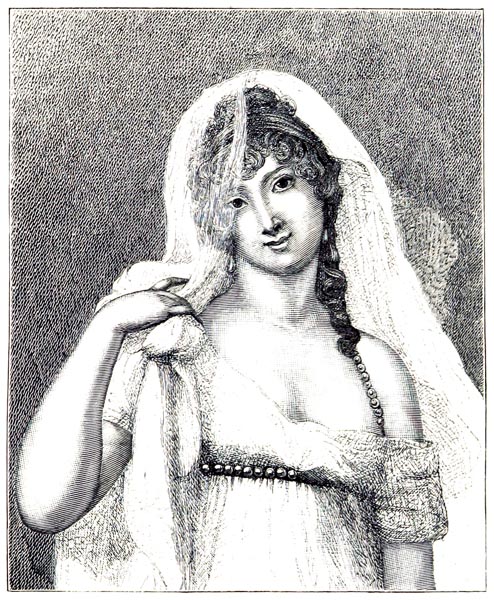
‘Madame Récamier’
Les deux France. Histoire d'un Siècle, 1789-1889. Récits d'une Aïeule Centenaire [i.e. Mme Loyseau de Laubespin] - Mathurin François Adolphe de Lescure (p33, 1889)
The British Library
Monsieur Gisquet had made me free of all of his rooms, as I mentioned; but I did not abuse the privilege. Only on a single evening did I descend to listen, while seated between him and his wife, to Mademoiselle Gisquet playing the piano. Her father scolded her and pretended that she had not played the sonata as well as usual. This little concert given by my host, en famille, with only myself as audience, was quite singular. While this pastoral scene was played out in fireside intimacy, police officers kept me away from my colleagues with blows from rifle butts and steel-tipped batons; yet what peace and harmony reigned in the policemen’s hearts!
I had the happiness of being able to enlist a favour, the favour of prison, similar to the one which I enjoyed, on behalf of Monsieur Charles Philippon; condemned for his talent to some months in detention, he was spending them in a sanatorium at Chaillot; summoned to Paris as a trial witness, he profited from the occasion and did not return to his lodgings; but he repented of it: in his hiding place, he was no longer free to see his child whom he loved: he regretted his prison, and not knowing how to return to it, he wrote me the following letter begging me to negotiate the thing with my host:
‘Sir,
You are a prisoner and will understand, or you would not be Chateaubriand. I am a prisoner too, a voluntary prisoner, since placing myself in a state of siege at a friend’s house, a poor artist like myself. I wished to flee the justice of the military tribunal with which I was threatened by the seizure of my newspaper on the 9th of this month. But, in order to remain in hiding, I have foregone the embraces of a child I idolize, an adopted daughter aged five, my joy and delight. This deprivation is a torment which I cannot long endure, it is death to me! I will give myself up, and they will throw me in Sainte-Pélagie, where I can only see my poor child infrequently, if they will still allow it, and only at set times, and where I will tremble for her health, and die of anxiety, if I cannot see her every day.
I, a whole-hearted Republican, address myself to you, Sir, a Legitimist, a serious man and a parliamentarian, I a caricaturist and a partisan of the most incisive political character, address you whom I do not know and who are a prisoner like myself, begging you to ask the Prefect of Police if he will let me return to the sanatorium to which they transferred me. I engage on my honour to present myself whenever I am required and I renounce any attempt to escape whatever tribunal there may be, if they will leave my poor child with me.
You will believe me, Sir, when I speak of honour and swear not to flee, and I am sure you will be my advocate, though the deepest politicians might see there a fresh proof of alliance between Legitimist and Republicans, men whose opinions match so well.
If my request is refused to such a guest, such an advocate, I will know I have nothing more to hope, and that I must be separated from my poor Emma for nine months.
Whatever, Sir, may be the result of your generous intervention, my thanks will be no less eternal, since I have no doubts of the urgent solicitations which your heart will suggest to you.
Accept, Sir, the expression of my sincere admiration and believe me your very humble and very devoted servant.
CH. PHILIPPON,
Proprietor of La Caricature (journal),
condemned to thirteen months in prison.
Paris, the 21st of June 1832.’
I obtained the favour Monsieur Philippon asked for: he thanked me in a note which demonstrates, not the magnitude of the service (which reduced to my client being watched over at Chaillot by a gendarme), but the hidden delights of love, which cannot be truly understood except by those who have felt them.
‘Sir,
I leave for Chaillot with my darling child.
I wish to thank you, but I feel words are too cold to express the gratitude I feel; I have reason to believe, Sir, that your own heart will suggest some eloquent phrases. I am sure I will not be mistaken in thinking it will inform you that I am not ungrateful, and will portray for you better than I can the storm of happiness in which your goodness has placed me.
Accept, I beg you, Sir, my sincerest thanks and deign to regard me as your servant, and the most affectionate of your servants.
CHARLES PHILIPPON.’
To this singular mark of my credit, I will add this strange witness to my fame: a young employee in Monsieur Gisquet’s office addressed some fine verse to me which was passed on to me by Monsieur Gisquet himself; since in the end justice was demanded: if a literate government attacked me nobly, the Muses defended me nobly. Monsieur Villemain courageously pronounced in my favour and in the Journal des Débats itself my great friend Bertin protested, signing an article against my arrest. Here is what the poet, who signed himself J. Chopin, office-worker wrote to me:
TO MONSIEUR DE CHATEAUBRIAND
AT THE POLICE PREFECTURE.
Bowing to your genius, I dare
To dedicate my lines to thee
And bear, a streamlet flowing to the sea,
This tribute to the god of metre there.
Misfortune now has fallen on your brow
Serene as ever in the tempest’s blast.
What cares the poet for this fleeting Now?
Your glory will remain.our hatreds pass.
Gracious enemy, your voice, its power,
Have even lent a charm to error,
Yet your eloquence at such an hour
Absolves your heart of it forever.
A King struck once before at your freedom;
You showed, at his severity,
Your greatness: he fell: and is gone,
Yet you see only his misery!
Oh, who could sound your endless loyalty
And force the tide to turn aside again?
But while one party may applaud your zeal,
Your glory is for all...take back your pen.
J. CHOPIN,
Office-worker.
Mademoiselle Naomi (I think that is Mademoiselle Gisquet’s Christian name) often walked alone in the little garden book in hand. She would steal a glance towards my window. How sweet to have been delivered from my chains, as in Cervantes, by my gaoler’s daughter! While I was taking the romantic air, young and handsome Monsieur Nay came to dissipate my dream. I saw him talking with Mademoiselle Gisquet in that manner which cannot deceive us, we creatures of other sylphs. I fell from my clouds, closed the window and abandoned the idea of letting my white moustaches be blown about by the winds of adversity.
After a fortnight, a decree dismissing the case set me at liberty on the 30th of June, to Madame de Chateaubriand’s great happiness: she would have died, I fear, if my detention had continued. She came in a cab to fetch me; I filled it with my bit of luggage so swiftly that I was already leaving the Ministry, and I returned to the Rue d’Enfer with that something achieved which misfortune grants to virtue.
If Monsieur Gisquet is known to posterity through history, perhaps he has arrived there in a sorry enough state; I desire what I have just written about him to serve as a counter-balance on behalf of a renowned enemy. I have nothing but praise for his kind attentions: Doubtless, if I had been condemned he would not have let me escape, but he and his family treated me with the propriety, the good grace, the sense of my position, of who I was and had been, that an educated administration had not shown, nor lawyers all the more brutal in that they acted against the weak and showed no fear.
Of all the governments which France has suffered in forty years, that of Philippe is the only one that has thrown me in gaol; it placed its hand on my head, on a head respected even by an angry conqueror; Napoleon lifted his arm but did not strike. And why that anger? I will tell you: I dared to protest in favour of right, against the tide of events, in a country in which I demanded liberty under the Empire, and glory under the Restoration; in a country where I alone take account not of brothers, sisters, children, joys, pleasures, but of graves. The recent political changes have parted me from my friends: some have gone on to make their fortunes, and they pass by my poverty swollen with dishonour; others have abandoned their homes exposed to insult. The generation so greatly in love with freedom has been sold: mean in their conduct, intolerable in their pride, mediocre or foolish in their writings, I expect nothing but disdain from that generation and I return it in kind; they have nothing about them that I understand, they know nothing of loyalty to a given oath, love of generous institutions, respect for one’s own opinion, scorn of success or gold, the felicity of sacrifice, the religion of weakness and misfortune.
Book XXXV: Chapter 8: A letter to the Justice Minister and his reply.
Paris, the end of July 1832.
BkXXXV:Chap8:Sec1
After the decree dismissing the case, I was left with one duty to fulfil. The offence of which I had been accused was linked to that for which Monsieur Berryer had been detained in Nantes. I had been unable to explain this to the examining magistrate since I had refused to recognize the tribunal’s competence. In order to repair the damage my silence may have caused Monsieur Berryer, I wrote the letter you are about to read, to the Minister of Justice, and made it public through the newspapers.
‘Paris, this 3rd of July 1832.
Monsieur le Ministre de la Justice,
Allow me, in writing to you, to fulfil a duty of conscience and honour in the interests of a man who has been deprived of his liberty for too long.
Monsieur Berryer the Younger, during his interrogation by the examining magistrate in Nantes on the 18th of last month, replied: That he had seen Madame la Duchesse de Berry; that he had advised her with the respect due to her rank, her courage and her misfortunes, of his personal opinions and that of his honourable friends regarding the present situation in France, and on the consequences of her Royal Highness’ presence in the West.
Monsieur Berryer, expanding on this vast subject with his usual skill, had summarised it for her in this way: No war, foreign or civil, even supposing it crowned with success, can suppress or rally opinion
Questioned about the honourable friends of whom he had just spoken, Monsieur Berryer said markedly: That serious men having maintained in the present circumstances an opinion in agreement with his own, he had thought it a duty to support his advice with their authority; but that he could not name them without their consent.
Monsieur le Ministre de Justice, I am one of those people Monsieur Berryer consulted. Not only did I approve his advice, but I even wrote a letter construed in that sense. It would have been handed to Madame la Duchesse de Berry, in the event that the Princess had really been on French soil, which I did not believe to be the case. That first note being unsigned, I wrote a second which I signed and in which I begged that intrepid mother of Henri IV’s scion, with more insistence, to leave a land split by such discord.
Such is the statement I owe Monsieur Berryer. The true guilt, if there is guilt, is mine. This statement will serve I hope to initiate a prompt deliverance for the prisoner of Nantes; it will only leave the burden of a deed weighing on my head which was innocent without doubt, but whose consequences, in the final result, I accept completely.
I have the honour to be, etc.
CHATEAUBRIAND.
84, Rue d’Enfer-Saint-Michel.
Having written to Monsieur le Comte de Montalivet, on the 9th of last month, regarding the affairs of Monsieur Berryer, Monsieur le Ministre de l’Interieur did not even think it necessary to let me know he had received my letter; as I am greatly concerned to learn the fate of this one, which I have the honour to write to Monsieur le Ministre de Justice today, I would be infinitely obliged to him if he would have his office acknowledge its receipt.
CH.’
The Justice Minister’s reply was prompt; here it is:
‘Paris, the 3rd of July.
Monsieur le Vicomte,
The letter which you have addressed to me, containing information which may aid the course of justice, I have had sent on immediately to the King’s Prosecutor on the Nantes tribunal, so that it may be included in the evidence in the case that has commenced against Monsieur Berryer.
I am with respect, etc,
Keeper of the Seal,
BARTHE.
By this response Monsieur Barthe graciously reserved the right to institute fresh proceedings against me. I remember the proud disdain of the great men of the ‘Centre Ground’ when I let slip the possibility of violence against myself or my writings. What! Goodness, why ward off imaginary dangers? Who could be embarrassed by my opinions? Who would dream of touching a single hair of my head? Friends and supporters of the cooking-pot, intrepid heroes of peace at any price, nevertheless you must own to your Terror, that of the police and the law, your Paris under siege, your thousand Press trials, your military commission to condemn the author of Cancans to death; you still plunged me into gaol; the punishment applicable to my crime was nothing less than capital punishment. It would have been a pleasure to lose my head, if, thrown into the scales of justice, that might have tilted them towards the side of honour, glory and my country’s freedom!
Book XXXV: Chapter 9: Charles X offers to pay me a Peer’s pension: my response
Paris, Rue d’Enfer, end of July 1832.
BkXXXV:Chap9:Sec1
I was more than ever determined to resume my exile; Madame de Chateaubriand, frightened by my adventure, already wished to be far away; it was not a question of deciding where to pitch our tents. The great difficulty was to find enough money to live in a foreign land and firstly to pay my debts which were attracting threats of pursuit and seizure.
The first year of an Embassy always ruins the Ambassador: that is what happened to me in Rome. I resigned at the advent of Polignac’s Ministry, and had added to my usual poverty sixty thousand francs in loans. I knocked at all the Royalist banks, none opened to me: I was advised to try Monsieur Lafitte. Monsieur Lafitte advanced me ten thousand francs which I immediately gave to my most hard-pressed creditors. From the proceeds of my pamphlets I recovered that amount which I repaid him with thanks; but thirty thousand francs still remained unpaid besides my old debts, some of which had grown beards they were so aged; unfortunately those beards were golden ones, whose annual trim came from my chin.
Monsieur le Duc de Lévis, returning from his trip to Scotland, told me on behalf of Charles X that the Prince wished to resume paying me a Peer’s pension; I thought I should refuse the offer. The Duc de Lévis returned to the issue when he saw that on leaving prison I was in the deepest embarrassment, gaining nothing by my house and garden in the Rue d’Enfer, and harassed by a swarm of creditors. I had already sold my silverware. The Duc de Lévis brought me twenty thousand francs, telling me in a noble manner that it was merely the two years of income which the King realised he owed me, and that my debts in Rome were simply debts of the Crown. That sum set me free, and I accepted it as a temporary loan, writing the King the following letter (You will read about my conversation with Charles X on the subject of this loan during my first trip to Prague. Note: Paris, 1834):
‘Sire,
In the midst of the disasters with which it has pleased God to sanctify your life, you have not forgotten those who suffer at the foot of Saint-Louis’ throne. You deigned, some months ago, to convey to me your generous suggestion of resuming my Peer’s pension which I renounced on refusing to take the oath to an illegitimate power; I know Your Majesty has servants poorer than I am and worthier of your kindness. But the last works I published have caused me difficulties and have excited persecution; I have tried in vain to sell the few things I possess. I am forced therefore to accept, not the annual pension which Your Majesty proposes I should levy on Royal poverty, but a temporary aid to free me from the embarrassments which prevent my regaining a sanctuary where I might live by my own labour. Sire, I must be very unfortunate to have become a burden, for even a moment, on the Crown which I have supported with all my efforts and which I will continue to serve for the rest of my life.
I am with the profoundest respect, etc.
CHATEAUBRIAND.’
Book XXXV: Chapter 10: A note from Madame la Duchesse de Berry – A letter to Béranger – Departure from Paris
Paris, Rue d’Enfer, 1st to the 8th of August 1832.
BkXXXV:Chap10:Sec1
My nephew Count Louis de Chateaubriand, for his part, advanced me a similar sum of twenty thousand francs. Thus freed of material obstacles I made preparations for my second departure. But a matter of honour restrained me: Madame la Duchesse de Berry was on French soil; what would become of her, and should I not stay in the country to which her perils might summon me? A note from the Princess which arrived from the depths of the Vendée served to set me free.
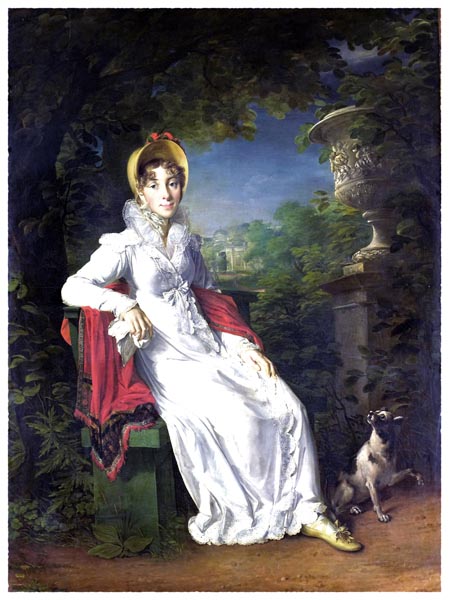
‘Portrait of Marie Caroline Ferdinande Louise de Naples, Wife of Charles Ferdinand, Duke de Berry, in the Park de Bagatelle in the Bois de Boulogne, Paris’
François Pascal Simon Gérard (Baron), 1820 - 1837
The Rijksmuseum
‘I am writing to you, Monsieur le Vicomte, regarding that provisional government, which I had thought to form when I was ignorant as to when, and even if, I might return to France, and in which I was told you had consented to take part. It did not in fact exist, since it never met, and some of its members only agreed in order to offer me advice which I could not follow. I am not at all ungrateful to them for it. You judged, according to the report made to you, my situation, and that of those regions which have better reason than I to understand the effects of a fatal influence, in a manner which I did not choose to accept, and I am sure that if Monsieur de Chateaubriand had been with me, his noble and generous heart would have equally rejected it. I nonetheless rely on the good offices of various individuals and even on the advice of people who formed part of the provisional government, the choice of whom was dictated by their known zeal and devotion to the Legitimacy in the person of Henri V. I hear that it is still your intention to leave France, and I would regret it greatly if I were able to draw you closer to me; yet you have weapons which strike from a distance and I hope you will not cease to fight for Henri V.
Believe wholly, Monsieur le Vicomte, in my esteem and friendship.
M. C. R’
In this note, Madame neglected my services to her, and accepted nothing of the advice I had dared to give her in the note of which Monsieur Berryer had been the bearer; she even seemed a little wounded by it, even though she recognised that a fatal influence had lead her astray.
Thus, set at liberty and disengaged from everything, today the 7th of August, having nothing left to do but go, I wrote a farewell letter to Monsieur de Béranger, who had visited me in prison.
‘Paris, the 7th of August 1832.
To Monsieur de Béranger,
Sir, I wish to say farewell and to thank you for remembering me; time is short and I am forced to leave without having the pleasure of seeing and embracing you. I am ignorant of the future: is there an obvious future for anyone these days? We are not in an age of revolution, but of social transformation: now, transformations take place slowly, and the generations which are part of the period of metamorphosis perish wretchedly and obscurely. If Europe (as she may well be) is in an age of decrepitude that is another matter: she will produce nothing, and will fade away in an impotent chaos of passions, morals and doctrines. In that case, Sir, you will have sung over a tomb.
I have fulfilled all my engagements, Sir: I returned to your singing; I have defended what I came to defend; I have survived the cholera: I am returning to the mountains. Do not break your lyre as you threatened; I owe to it one of my most glorious titles to human remembrance. Keep France smiling and weeping: since, by a secret you alone know, it seems that in your popular songs the words are happy yet the music is plaintive.
I recommend myself to your friendship, and to your Muse.
CHATEAUBRIAND.’
I am to set out tomorrow. Madame de Chateaubriand will join me at Lucerne.
Book XXXV: Chapter 11: Journal from Paris to Lugano
Basel, 12th of August 1832.
BkXXXV:Chap11:Sec1
Many men die without losing sight of their neighbouring steeple; I cannot find the steeple which will see my death, In quest of a sanctuary in which to finish my Memoirs, I set off again, dragging behind me an enormous trunk full of papers, diplomatic correspondence, confidential notes, and letters from Ministers and Kings; it was History carried pillion by Romance.
I saw Monsieur Augustin Thierry at Vesoul, in retirement at his brother the Prefect’s house. As he has previously sent me, in Paris, his History of the Norman Conquest, I went to thank him. I found a youngish man in a room with half-closed blinds; he was almost blind; he tried to rise to welcome me, but his legs no longer bore his weight and he fell into my arms. He blushed when I expressed my sincere admiration for him: it was then that he told me that his work was based on mine, and that it had been while reading the Battle of the Franks in Les Martyrs that he conceived the idea of a new way of writing history. When I took my leave of him, he tried hard to follow me and dragged himself as far as the door by leaning on the wall: I left moved by so much talent and such misfortune.
Via Vesoul, Charles X, had returned after his long exile, he who was now making sail towards a fresh exile which would be his last.
I passed the frontier without incident with all my clutter: let us see whether, on the far side of the Alps, I cannot enjoy Swiss freedom and Italian sun, needed by my opinions and my years.
On entering Basel, I encountered an old Swiss, a customs officer; he made me undergo un bedit garandaine d’in guart d’hire: a little quarantine for a quarter of an hour; my luggage was taken into a cavern; something was set in motion which sound like a loom down below; a smell of vinegar arose, and thus free of French contagion, the good Swiss released me.
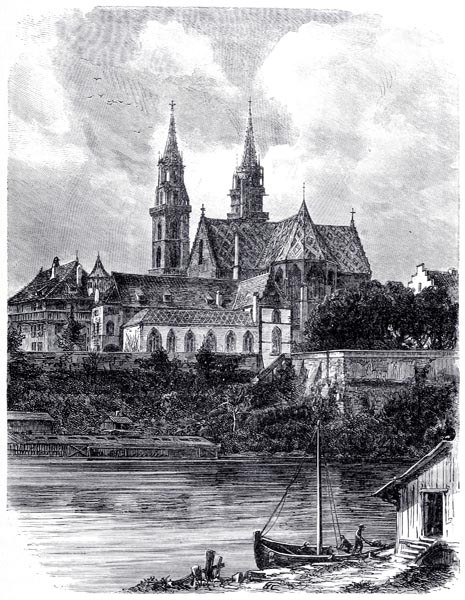
‘The Pfalz Terrace and the Cathedral Basel’
Switzerland: its Scenery and People - Theodor Gsell-Fels (p425, 1881)
The British Library
I said, in the Itinerary, while speaking of the storks of Athens: ‘From the heights of their nests, that revolution cannot touch, they saw the human race changing beneath them: while impious generations rose on the tombs of religious generations, the young storks always fed their aged fathers.’
I found a stork’s nest at Basel which I had left behind six years previously; but the hospital on whose roof the stork had built its nest was no Parthenon, and the sun over the Rhine is not that which shines on the Cephisus, the Council House is not the Aeropagus. Erasmus is not Pericles: yet there is something Roman and Germanic about the Rhine, the Black Forest, and Basel. Louis XIV extended the borders of France to the gates of this city, and three hostile monarchs passed through it in 1813 in order to sleep in Louis le Grand’s bed, defended in vain by Napoleon. Let us go and view Holbein’s The Dance of Death; it expresses human vanity.
The Dance of Death (if there was not already an accurate painting of it by then) took place in Paris, in 1424, in the Cemetery of the Innocents: it came to us from England. The representation of the spectacle was set down in fresco paintings; they were on view in the cemeteries of Dresden, Lübeck, Minden, La Chaise-Dieu, Strasbourg, and Blois in France, and Holbein’s pen immortalised those funereal delights in Basel.
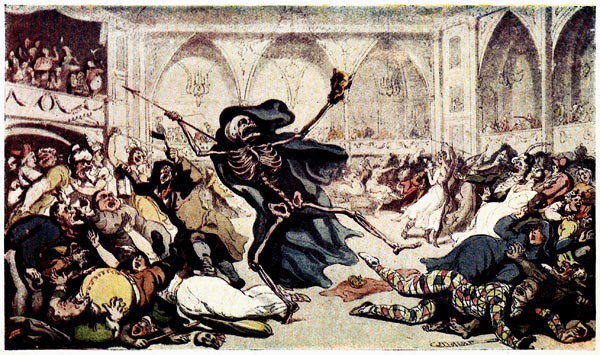
‘Such is the Power, & Such is the Strife, That Ends the Masquerade of Life’
The English Dance of Death, from the Designs of Thomas Rowlandson - William Combe, Thomas Rowlandson (p228, 1903)
Internet Archive Book Images
These danses macabres by great artists have in turn been carried off by Death, who spares not its own follies: of the work in Basel there only remain six truncated sections, on the walls of the cloister and deposited in the University library. A watercolour has preserved the overall design of the work.
These grotesques, in essence terrifying, have a Shakespearean quality, a mixture of the comic and the tragic. The characters display vivid expressions: rich and poor, young and old, men and women, Popes, Cardinals, priests, Emperors, Kings, Queens, Princes, Dukes, nobles, magistrates, soldiers, all struggle and argue with and against Death; none accept it with a good grace.
Death is infinitely varied, but always a farce like life, which is merely a grave comedy. This Death satirically painted is minus a leg like the wooden-legged beggar he accosts; he affects a mandolin at his bony back, like the musician he drags along. He is not always bald; strands of hair, blond, brown, grey hang down the skeleton’s neck making it more dreadful by rendering it more lifelike. In one of the panels Death almost has flesh, is almost a young man, and carries a young girl away with him who gazes at herself in a mirror. In his satchel Death has a schoolboy’s jeering tricks: he cuts a cord with scissors by which a dog leads its blind owner, and the blind man is two steps away from an open ditch; elsewhere, Death in a little cloak, approaches one of his victims with satirical gestures, like a Pasquin. Holbein was able to capture the idea of the very essence of this tremendous mockery: in reliquaries skulls always seem to be smirking because their teeth are revealed; it is a smile without lips to frame it and form the smile. What do they smile at: nothingness, or life?
Basel Cathedral pleased me, and especially the ancient cloisters. Walking around the latter, dense with funeral inscriptions, I found the names of various reformers. Protestantism chose its time and place badly when it located itself among Catholic monuments; what is has reformed is less visible than what it has destroyed. Those dry pedants who thought to recreate primitive Christianity, within a Christianity that has moulded society for fifteen centuries, proved unable to erect a single monument. What would such a monument have echoed? How could it relate to its time? Men in the age of Luther and Calvin were not made like Luther and Calvin; they were formed like Leo X with the spirit of Raphael, or Saint Louis with a Gothic spirit; a minority believed in nothing, the majority believed in everything. Has not Protestantism for temples only schoolrooms, and for churches the cathedrals it has devastated? There its nakedness is revealed. Jesus Christ and his apostles doubtless failed to resemble the Greek and Romans of their era, but they did not come to reform an ancient religion; they came to establish a new religion, to replace gods by the One God.
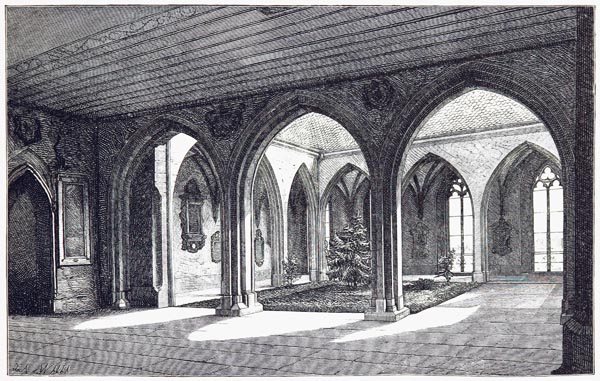
‘The Cloisters of the Cathedral of Basel’
Switzerland: its Scenery and People - Theodor Gsell-Fels (p429, 1881)
The British Library
BkXXXV:Chap11:Sec2
Lucerne, 14th of August 1832.
The road from Basel to Lucerne through Aargau, offers a series of valleys some of which resemble the valley of Argèles, without the skies of the Spanish Pyrenees. At Lucerne, mountains variously grouped, tinted, stacked in tiers, outlined against the heavens, end by retiring behind one another and vanishing into the distance, in the neighbouring snows of Saint Gothard. If you removed Mount Rigi and Mount Pilatus, but retained the hills clothed with greenery and fir trees which immediately border the Lake of the Four Cantons (Lake Lucerne), you would create an Italian lake.
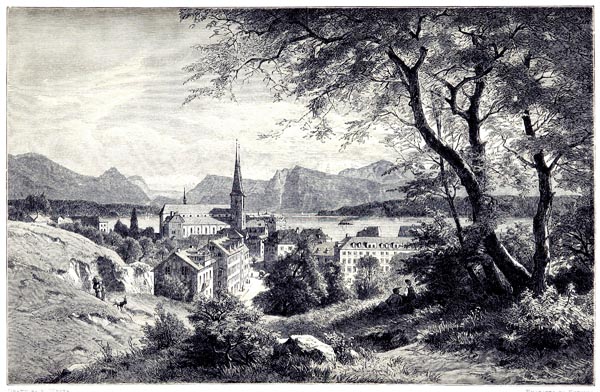
‘Lucerne’
Switzerland: its Scenery and People - Theodor Gsell-Fels (p237, 1881)
The British Library
The arcades of the cemetery cloister with which the Cathedral is surrounded are like boxes from which you enjoy this view. The cemetery monuments have as standard a little iron cross carrying a gilded Christ. In the sun’s rays they are like so many points of light escaping from the tombs; at intervals there are fonts of holy water in which branches are soaking with which one can bless the ashes of the departed. I wept for no one in particular there, but I made the purifying dew descend on that silent community of unfortunate Christians, my brothers. One epitaph told me: Hodie mihi, cras tibi: I today, you tomorrow; another: Fuit homo: this was a man; another: Siste Viator, abi, viator: stop passer-by; go passer-by. And I wait on tomorrow; and shall have been a man; and passer-by I halt; and passing by I go. Leaning against an arcade of the cloister, I gazed for hours at William Tell’s and his companions’ theatre of action: the theatre of Helvetic freedom so well sung and pictured by Schiller and Johannes von Müller. My eyes searched that vast picture for the presence of the most illustrious dead, and my feet trampled the ashes of the most anonymous of them.
Seeing the Alps again four or five years ago, I asked myself what I had come for: how would I answer today? How would I answer tomorrow or the next day? Pity me who cannot grow old and is forever ageing!
Lucerne, 15th of August 1832.
The Capuchins have gone this morning, according to custom on this Day of Assumption, to bless the mountains. These monks profess the religion under whose protection Swiss independence was born: that independence still endures. What will become of our modern liberty, cursed as it is by the blessings of philosophers and executioners? It is only forty years old and has already been sold and re-sold, rigged out and traded on every street-corner. There is more freedom in a Capuchin’s habit as he blesses the Alps than in all the frippery of the legislators of the Republic, Empire, and Restoration, and the Usurpation of July.
The French traveller in Switzerland is moved and saddened; our history, to the misfortune of the people of these regions, is linked too closely to their history; Swiss blood has flowed for us and through us; we have borne fire and the sword into William Tell’s cottage; we have involved their peasant warriors, who guarded the throne of our kings, in our civil wars. Thorwaldsen’s genius has set a remembrance to the 10th of August at the entry to Lucerne. The Swiss lion expires, pierced by an arrow, covering with his lowered head and one of his paws the French escutcheon, of which only a single fleur-de-lis is visible. The chapel consecrated to the victims, the clump of green trees which stands near the bas-relief sculpted in the rock, the soldier who escaped the massacre of the 10th of August who shows visitors the monument, the note from Louis XVI ordering the Swiss to lay down their arms, the altar screen offered by Madame la Dauphine to the expiatory chapel, and on which that perfect model of grief embroidered the sacrifice of the Divine Lamb!...By what device of Providence, after the recent fall of the Bourbon throne, have I been led to seek a sanctuary close to this monument? At least I can contemplate it without blushing; I can place my hand, feeble but not perjured, on the escutcheon of France, while the lion grasps it with his powerful claws, though extended in death.
Well, a member of the Diet has proposed to demolish that monument! What does Switzerland want: Freedom? She has enjoyed it for four centuries: Equality? She has it: A Republic? That is her mode of government; the alleviation of taxes? She pays almost no duty. What does she want then? She wants change: that is human nature. When a nation, altered by time, can no longer remain where it is has been, the first symptom of its malady is hatred of the past and its own ancestral virtues.
I returned from the monument of the 10th of August across a large covered bridge, a sort of wooden gallery suspended above the lake. Two hundred and thirty-eight triangular paintings, placed between the roof-beams, decorate this gallery. They are popular illustrations from which the Swiss, as they pass by, learn the history of their religion and their freedom.
I saw tame water-fowl; I preferred the wild waterfowl on the lake at Combourg.
In the town, the sound of a choir met me; it was emerging from a chapel of the Virgin: entering the chapel, I thought I had been transported back to my childhood. Before four altars, decorated devotedly, women were reciting the rosary and the litanies with the priest. It was like evening prayers at the edge of the sea in my poor Brittany, and I was at the edge of Lake Lucerne! A hand thus raises the two ends of my life in order to make me feel more deeply all that has been lost in the chain of my years.
On Lake Lucerne, 16th of August 1832, noon.
Alps, lower your summits, I am not worthy of you: young, I would have been solitary; old, I am merely isolated, I can still describe nature effectively; but for whom? Who would care about my pictures? What arms, other than those of time, would press my genius to a bare brow in recompense? Who would repeat my songs? To what Muse would I dedicate them? Beneath the vault of years as beneath that of the snowy peaks around me, no ray of sunlight will come to warm me. How pitiful to drag my weary steps, which no one would follow, over those mountains! What misfortune to find myself free to wander only at the end of my life!
Two p.m.
My boat reached the jetty of a house on the right-hand shore of the lake, before the entrance to the Bay of Uri. I climbed through the orchard below this inn and am sitting beneath two walnut trees which shelter a cow-shed. Before me, a little to the right, on the opposite shore of the lake, spreads the village of Schwytz, among orchards, and the smooth slopes of those pastures called alps in this country: it is overlooked by a semi-circle of jagged rock whose two peaks the Mythen and the Haken (the Mitre and the Cross) take their names from their form. This horned cornice sits above the meadows, like the enduring crown of Swiss freedom on the brow of a nation of shepherds. The silence around me is only interrupted by the little tinkling bells on the necks of two heifers penned in a nearby stall: they seem to me to sound the glory of the pastoral liberty that Schwytz has given, with its name, to a whole nation: a little canton in the neighbourhood of Naples, called Italia, likewise, but with less sacred rights, gave its name to the land of the Romans.
Three p.m.
We are leaving; we are entering the Bay or Lake of Uri. The mountains rise higher and darker. Here is Grutli’s grassy rump and the three springs where Fürst, Melchtal and Stauffacher swore independence for their country; here, at the foot of the Achsenberg, is the chapel which marks the place where Tell, leaping from Gessler’s boat, drove it into the waves with a blow from his foot.
But did Tell and his companions really exist? Are they not Northern characters, born from the chants of the Skalds, and of whom the heroic tradition is found on Swedish shores? Are the Swiss today what they were at the time when they won their freedom? Those bear trails, those rocks of groaning (hackenmesser: heel-cutters) see carriages roll by where Tell and his companions leapt, crossbow in hand, from precipice to precipice: am I a traveller myself in harmony with these places?
Luckily a storm has just assailed me. We land in an inlet, a few steps from Tell’s chapel: it is ever the One God who raises the winds, and our trust in that same God which reassures men. As before, crossing the Ocean, the American Lakes, and the waters off Greece, and Syria, I wrote on sopping-wet paper. The clouds, the waves, the claps of thunder combine more fittingly with Alpine liberty than the voice, effeminate and degenerate in nature, that my century has lodged in my throat despite me.
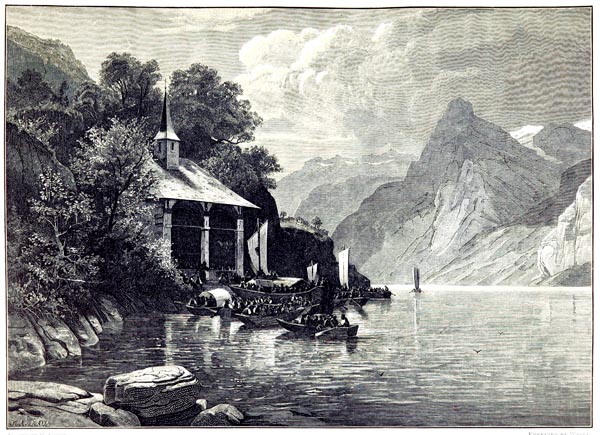
‘Tell's Chapel on the Tellenplatte, Bay of Uri’
Switzerland: its Scenery and People - Theodor Gsell-Fels (p175, 1881)
The British Library
Disembarking at Flüelen, and reaching Altdorf, a lack of horses detains me at the foot of the Bannberg for the night. Here, William Tell shot the apple from his son’s head: the bow-shot was the distance which separates these two springs. Let us believe it, despite the same story being told by Saxo Grammaticus, which I first cited in my Essai sur les Révolutions; let us have faith in religion and liberty, the only two things regarding humanity that are great: glory and power are brilliant, not great.
Tomorrow, from the heights of the Saint-Gothard, I will greet that Italy again that I greeted from the summit of the Simplon and Mont-Cenis. But what good is this last glance at the regions of the south and the dawn! The pine-tree, among glaciers, cannot go down to the orange-trees he sees below him in the flower-filled valleys.
Ten at night.
The storm begins again; lightning twists among the rocks; echoes increase and prolong the noise of thunder; the roar of the River Reuss and of the Schächen torrent welcomes the Armorican bard. It is a long while since I have been free and alone; no one else in the room I am enclosed by: two beds for an ageing traveller who has neither love to cradle, nor dreams to make. These mountains, this storm, this night are treasures lost to me. What life, though, I feel in the depths of my soul! Never, not even when the most ardent blood pulsed from my heart to my veins, have I uttered the language of passion with such energy as I could achieve at this moment. It seems to me I see my sylph of the Combourg woods emerging from the flanks of the Saint-Gothard. Do you seek me once more, delightful phantom of my youth? Have you taken pity on me? You see, I am only altered in face; ever dreaming, devoured by a fire without cause, without fuel. I am leaving the world, and I entered it as I created you, in a moment of ecstasy and delirium. This is the hour when I invoke you in turn. I will open my window then, to let you enter. If you are not content with the graces I blessed you with, I will make you a hundred times more seductive; my palette is not exhausted; I have seen more of beauty and know better how to paint it. Come and sit on my knee; do not be frightened by my grey hairs, caress them with your fingers, those of a fairy or a shade; let them darken again under your kisses. This brain, which these falling locks do not calm, is as foolish as it was when I gave you being, eldest daughter of my illusions, sweet fruit of my secret passions and my first solitude! Come, let us climb through the clouds, together still; we will travel with the lightening, criss-crossing, illuminating, flaring above the precipices where tomorrow I will go. Come! Carry me with you as before, and never bring me back.
There is a knock at the door; it is not you! It is the guide! The horses are here, we must leave. Of this dream, only the wind and rain remain, and I, a dream without end, an eternal storm.
17th of August 1832 (Amsteg)
From Altdorf to here, a narrow valley between mountains, as one sees everywhere: the Reuss roaring in its midst. At the Stag Inn, a young German student coming from the glaciers of the Rhône, said to me: ‘Du com from Altdorf zis morning? Qvick vork!’ He thought I was on foot like him; then, seeing my wagon with its bench-seats: ‘Oh! Horzes! That’s anodder ting.’ if the student had wished to exchange his young limbs for my wagon and worse still my chariot of glory, with what pleasure I would have accepted his stick, his grey tunic, and golden hair. I would cross the Rhône glaciers; I would speak the language of Schiller to my mistress, and I would dream deep on German liberty; he would travel, aged like the times, bored like the dead, disillusioned by experience, having round his neck, like a bell, a fame which he will be more weary of after a quarter of an hour than the Reuss in torrent. The exchange will not take place; those goods are not for me. My scholar is leaving; he speaks to me while doffing and replacing his German cap, with a little nod of the head: ‘Permit me!’ Then, a shade, he vanishes. The scholar does not know my name; he will have met me, and never know it: I am delighted with that idea: I aspire to the shadows with more ardour than I once wished for the light: the latter irks me either by illuminating my miseries or by showing me objects I can no longer enjoy: I hasten to pass the torch to my neighbour.
Three little boys drawing their crossbows: William Tell and Gessler are everywhere. Free nations retain memories of the source of their independence. Ask a little ragamuffin in France if he has ever thrown an axe in memory of King Hlowigh or Khlowig or is it Clovis!
Book XXXV: Chapter 12: The Saint-Gothard Pass
BkXXXV:Chap12:Sec1
The new Saint-Gothard road, on leaving Amsteg, weaves to and fro in a zigzag for six miles; now joining the Reuss, now moving away as the torrent’s ravine widens. In the perpendicular plane of the landscape, short slopes or clumps of coppiced beech, peaks rising into the blue, ice-covered domes, summits naked or retaining a few streaks of snow like locks of white hair; in the valley, bridges, huts of blackened timber, walnut and fruit trees which gain in a wealth of leaves and branches what they lose in the succulence of their fruit. Alpine nature forces these trees to return to the wild; the ancient sap reveals itself despite the graft: an inner energy breaks the bounds of civilisation.
A little higher, on the right bank of the Reuss, the scene changes: the river descends in falls through a stony channel, under a double and triple avenue of pines, forming the Pont-d’Espagne valley at Cauterets. On sections of the mountain, larches clothe ridges of broken rock; moored by their roots, they resist the buffeting of storms.
Along the roadside, only a few patches of earth given over to potatoes testify to the presence of man: he must eat and journey; a summary of his history. There is no sign of the herds, relegated to higher regions of pasture: no birds; no likelihood of eagles: the great eagle plunged into the ocean in crossing to St Helena; there is no flight however strong and high that does not fail in the immensity of the heavens, The royal eaglet has just died. Other eaglets of July 1830 have been proclaimed; apparently they have descended from their eyrie to nest among the pigeons. They no longer rise with chamois in their talons; reduced to a domesticated gleam, their flickering gaze will no longer contemplate the free glittering sun of France’s glory from the summit of Saint-Gothard.
Book XXXV: Chapter 13: The Schöllenen Gorge – Devil’s Bridge
BkXXXV:Chap13:Sec1
Having crossed the Priest’s Leap bridge, and rounded the hillock of Wasen village, the right bank of the Reuss is regained; on either side waterfalls show white among the grassy slopes extending like green tapestries above the traveller’s head. Through a defile you can see the Ranz glacier which is linked to the glaciers of the Furca.
Finally, you enter the Schöllenen Gorge, where the first ascent of the Saint-Gothard begins. The valley is a two thousand foot steeple cut in a sheer granite block. The faces of the block form gigantic overhanging walls. The mountains offer no more than their flanks and their blazing reddened crests. The Reusse thunders down its vertical bed, strewn with rocks. A fragment of some turret bears witness to former days, as if nature here accuses the forgotten centuries. Suspended in the air by walls along the granite mass, the road, a motionless torrent, runs parallel to the living torrent of the Reuss. Here and there, masonry archways provide the traveller with shelter from avalanches; then one winds for several yards through a kind of twisting funnel, and suddenly, in one of the spirals of the conch, you find yourself facing the Devil’s Bridge.

‘Le Pont du Diable’
Le Monde Moderne (p192, 1895)
Internet Archive Book Images
The bridge today cuts through the arch of the new bridge higher up, built behind and overlooking it; the old bridge thus transformed looks like nothing more than a short aqueduct with two tiers. The new bridge, when one approaches from Switzerland, hides the descending falls. To enjoy the cascade’s rainbows and spray, you must stand on the bridge; but when one has seen Niagara there are no other falls like them. My memory endlessly compares episodes from my travels, mountains with mountains, rivers with rivers, forests with forests, and my life consumes my life. The same thing happens in respect of men and society.
Modern roads, which the Simplon exemplifies and effaces, do not achieve the picturesque effects of the older roads. The latter, more natural and more daring, avoided no difficulty; they barely skirted the courses of torrents; they climbed and descended with the terrain, mounted the rocks, plunged over precipices, passed beneath snowfields, taking nothing from the delights of the imagination and the joys of danger. The old Saint-Gothard route for example was much more adventurous than the present one. Devil’s Bridge merited its name, when on approaching it one saw the cascading Reuss above it, and that it traced out a gloomy arc, or rather a narrow defile through the bright spray of the falls. Then, at the end of the bridge, the road climbed vertically, to reach the chapel whose ruins are still visible. At least the inhabitants of Uri had the pious notion of building a chapel other than the cascade itself.
Then, it was not men like us who once crossed the Alps, it was the Barbarian hordes or the Roman legions. It was caravans of merchants, knights, mercenaries, campaigners, pilgrims, prelates and monks. Strange stories are told: Who built the Devil’s Bridge? Who placed the Devil’s Rock in the meadow at Wasen? Here and there rise turrets; crucifixes, oratories, monasteries, and hermitages, guarding the memory of an invasion, an encounter, a miracle or a misfortune. Each mountain tribe retained its own language, dress, manners, and customs. It is true that in a wilderness one lacks an excellent inn; there is no champagne to drink; no newspapers to read; but if there are a few more thieves on the Saint-Gothard, there are merely a few less rogues in society. What a wonderful thing civilisation is! That pearl I leave to the first fine jeweller.
Suvorov and his soldiers were the last to travel this defile, at the end of which they encountered Masséna.
Book XXXV: Chapter 14: The Saint-Gothard
BkXXXV:Chap14:Sec1
Having emerged from Devil’s Bridge and the Urnerloch tunnel, you reach the meadows of Ursern, backed by slopes like the stony terraces of an arena. The Reuss runs peacefully through the midst of the greenery; the contrast is striking: in this tranquillity, society existed beyond and before revolution; men and empires slumbered two steps from the abyss into which they would fall.
At the village of L’Hospital the second ascent begins, which reaches the summit of the Saint-Gothard, filled with granite masses. These rolling masses, swollen, split, festooned to their summit with garlands of snow, resemble waves, foaming and frozen in an ocean of rock, on which man has left the undulations of his track.
‘At Mount Adula’s feet, in a thousand reeds, below,
The calm Rhine, proud of the progress of his flow,
Supported by a hand on his tilted urn, sleeps
To the soothing sound of his swelling deeps.’
Very fine lines though inspired by the Versailles’ rivers of marble. The Rhine does not emerge from a bed of reeds: he rises from a frosted bed, his urn or rather urns are of ice; his origin is cognate with that of those Northern races whose adoptive river and warrior’s baldric he became. The Rhine, born from the Saint-Gothard in the Grisons, flows to the waters of the seas of Holland, Norway and England; the Rhone, also a child of Saint-Gothard, carries its tribute to Neptune to Spain, Italy and Greece: sterile snows form reservoirs for the fecundity of the ancient and the modern world.
Two lakes, on the Saint-Gothard plateau, give birth, one to the Ticino the other to the Reuss. The source of the Reuss is lower than the source of the Ticino, so that by digging a canal a few hundred feet long, you could divert the Ticino into the Reuss. If you repeated the same exercise with the principal tributaries of these waters, you would produce strange metamorphoses in the countries at the foot of the Alps. A mountain dweller can delight in damming a river, of enriching or impoverishing a country; here is something to diminish the pride of the powerful.
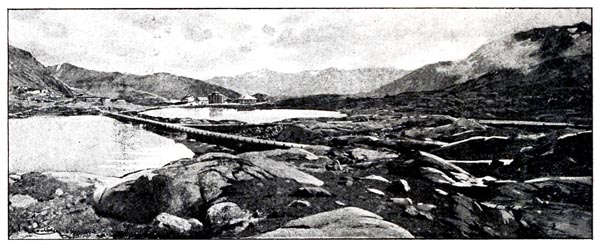
‘Col et Lac du Saint-Gothard’
Le Monde Moderne (p189, 1895)
Internet Archive Book Images
What a wonderful thing to see the Reuss and the Ticino exchange an eternal adieu and go their separate ways down the twin slopes of Saint-Gothard: their cradles touch; their fates are different: they go to find other lands and other suns; but their mothers, always linked, endlessly nourish their separate children from the heights of solitude.
On Saint-Gothard, there was once, a hospice run by Capuchins; there is nothing to see now but ruins: the only trace of religion is a worm-eaten wooden cross with its figure of Christ: God remains when man departs.
On the Saint-Gothard plateau, a wilderness in the sky, one world ends and another begins: German names give way to Italian ones. I am leaving behind my companion, the Reuss, which lead me onwards, as I re-ascended it from Lake Lucerne, in order to descend to Lake Lugano with my new guide the Ticino.
The Saint-Gothard is a vertical cut on the Italian side; the road which plunges into the Tremola Valley does honour to the engineer obliged to design it in the narrowest of gorges. Seen from above, the road resembles a ribbon folded and refolded upon itself; seen from below, the walls which support the causeway look like the outworks of a fortress, or imitate those dykes raised one on top of another against invasion by the waves. Sometimes too, one would liken the double line of boundary stones planted at regular intervals on both sides of the road, to a column of soldiers descending the Alps to invade unfortunate Italy once more.
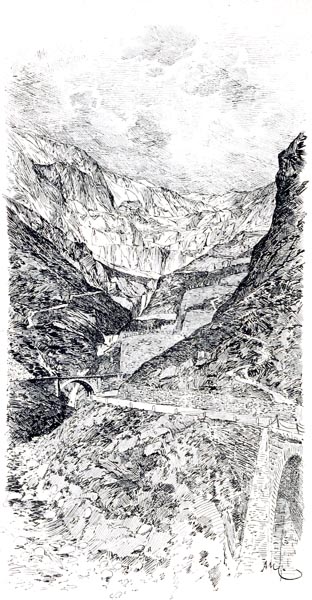
‘Le Val de Tremola’
Le Monde Moderne (p187, 1895)
Internet Archive Book Images
Saturday, the 18th of August 1832. Lugano.
I passed through Airolo, Bellinzona and the Leventina Valley: I did not see the countryside, I only heard the torrents. In the sky, the stars rose among the domes and spires of mountains. The moon was not yet above the horizon but her light ran before her, like those glories with which the fourteenth century painters encircled the Virgin’s head; at last she appeared, eaten into, reduced to a quarter of her disc, over the jagged summit of Furca; the points of her crescent resembled wings; one might have thought her a white dove fleeing her rocky nest: by her light, weakened and rendered more mysterious, the concave luminary revealed Lake Maggiore at the end of the Levantina Valley. I had seen the lake twice before, once when travelling to the Congress of Verona, and again when starting my Rome Embassy. Then I contemplated it in the sun, from the path of prosperity; now, I saw it at night, from the opposite shore, and the path of adversity. Between my journeys, separated by only a few years, lay no less than a fourteen-century old monarchy.
It is not that I could care less about political revolution; in giving me my freedom, they return me to my true self. I have enough sap in me still to recreate the first fruit of my dreams, enough fire to renew my relationship with the imaginary creature of my desires. The age and the world I have traversed have been no more than a double solitude to me, in which I have retained inwardly the self that heaven created. Why should I bewail the flight of days, when I have lived as much in an hour as those who have spent years trying to live?
Book XXXV: Chapter 15: A description of Lugano
BkXXXV:Chap15:Sec1
Lugano is a small town with an Italian feel: porticoes like those in Bologna; people conducting their lives in the street as in Naples, Renaissance architecture; roofs jutting out from walls lacking cornices, long narrow windows, bare or decorated with capitals and pierced to the architrave. The town has its back to a vine-covered slope that overlooks two superimposed mountain plateaux, one of meadows, the other forested: the lake lies at their feet.
To the east of Lugano, on the highest summit of the mountains there is a hamlet where the women, tall and pale, have the reputation of being Circassians. There was a procession to this hamlet on the eve of my arrival; people were going on a pilgrimage to Beauty: this tribe will be some remnant of a race of Northern barbarians preserved without admixture among the population of the plain.
I have been shown various houses indicated as being suitable for me: I have found a delightful one, but the rent is too high.
In order to obtain a better view of the lake, I took a boat. One of the two boatmen spoke a Franco-Italian jargon interlarded with English. He named the mountains and the mountain villages for me: San Salvatore, from whose summit can be seen the dome of Milan cathedral; Castagnola, with its olive trees, twigs of which visitors wear in their buttonholes; San Giorgio, capped by its hermitage: each of these places has its history.
Austria, who takes all and gives nothing, holds a village at the foot of Mount Caprino annexed to the territory of Ticino. Facing it, on the other side, at the foot of San Salvatore, she still possesses a kind of promontory on which stands a chapel; but she has graciously lent this promontory to the people of Lugano to execute their criminals on, and erect their gibbets. She will someday claim this high justice, exercised by her permission on her territory, as proof of her suzerainty over Lugano. They no longer subject the condemned to the torment of a rope these days, they cut off their heads: Paris provided the mechanism, Vienna the theatre of torment: gifts worthy of those two great monarchies.
These images were pursuing me, when on the azure wave, to the sighs of a breeze perfumed with pine resin, the boats belonging to some confraternity passed, throwing bouquets into the lake to the sound of oboes and horns. Swallows played around my sail. Among these winged voyagers, shall I find again those I encountered one evening while wandering the ancient road from Tivoli and Horace’s villa? The poet’s Lydia was no longer among the swallows in the countryside around Tivoli; but I know that at that very moment another young girl was furtively carrying off a rose dropped in the abandoned garden of a villa of Raphael’s century, and sought only that flower in the ruins of Rome.
The mountains which surround Lake Lugano touch bases only at water-level, resembling islands separated by narrow canals; they reminded me of the grace, form and verdant nature of the Azores archipelago. Shall I wear away my last days of exile then beneath the smiling porticos where the Princess de Belgiojoso consumed the days of her youthful exile? Shall I finish my Memoirs at the threshold of that historic and classical land where Virgil and Tasso sang, where so many revolutions have been accomplished? Shall I recall my Breton fortunes in sight of the Ausonian Mountains? If their curtain were to rise, the plains of Lombardy would be revealed; beyond that Rome; beyond that, Naples, Sicily, Greece, Syria, Egypt and Carthage: distant shores I have measured, I who do not even possess the earth I press beneath the soles of my feet! And yet to die here, to end here: is that not what I wish for, what I seek? I do not know.
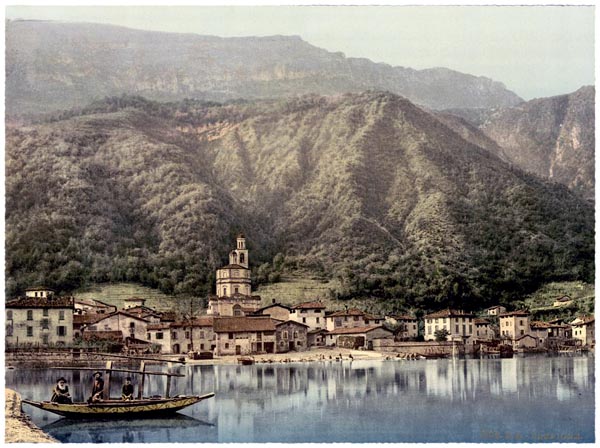
‘Lake Lugano’
Waterfront, Campione (i.e. Campione d'Italia, Lake Lugano), Italy: 1889
The Library of Congress
Book XXXV: Chapter 16: The mountains – Trips around Lucerne – Clara Wendel - Peasant prayers
Lucerne, the 20th-22nd of August 1832.
BkXXXV:Chap16:Sec1
I left Lugano without sleeping there; I re-crossed the Saint-Gothard, I saw once more what I had seen: I found nothing to add to my sketch. At Altdorf, everything had altered in twenty-four hours: the storm was no more, and there was no apparition in my lonely room. I have just spent the night at the inn in Fluelen, having twice covered a route whose extremities touch the two lakes and are held by two nations tied by the same political knot, and separated by every other relationship. I crossed Lake Lucerne, which has lost to my eyes a portion of its merit: it is to Lake Lugano what the ruins of Rome are to those of Athens, the fields of Sicily to the gardens of Armida.
Anyway, I have tried in vain to achieve the alpine exaltation of writers on mountain scenery, I am wasting my time.
As for the physical effects, that pure and balsamic air which should revive my powers, rarefy my blood, clear my weary brain, and give me an insatiable hunger and dreamless sleep, produces none of them. I breathe no more freely, my blood circulates no faster, and my head is no lighter under Alpine skies than in Paris. I have as good an appetite on the Champs Élysées as at Montenvers, I sleep as well in the Rue Saint-Dominique as on Mount Saint-Gothard, and if I have dreams on the delightful plain of Montrouge, they are such as sleep needs.
As for morality, I climb the rocks in vain, my spirit is no more elevated, my soul no purer: I bring the cares of the earth and the burden of human turpitude with me. The tranquillity of the marmot’s sub-lunar region does not communicate itself to my wakened senses. Wretch that I am, through the mists that flow beneath my feet, I always see the surface of the earth appear. A thousand heights scaled in space do not alter my view of the heavens one iota; God is no less great to me in the depths of the valley than on the summit of the mountain. If it is only necessary to look down from the clouds to become a healthy man, a saint, or a superior genius, why do so few invalids, miscreants and imbeciles go to the trouble of climbing the Simplon? They must be committed to their infirmities indeed.
A country is created only by the sun; it is light which makes a landscape. A Carthaginian beach, a tract of the Sorrento coast, a belt of dry reeds in the Roman Campagne lit by the flames of the rising or setting sun are more magnificent than all the Alps on this side of Gaul. So much for these holes called valleys, where you can see nothing at midday; these tall anchored screens called mountains; these torrents which bellow like the cattle on their banks; these purple faces, goitred necks, dropsical bellies!
If the mountains of this region justify their admirers’ praise, it is only when they are enveloped in night whose chaos they increase: their angles, ledges, projections, their mighty sweep, their immense shadowy ranges, add to the effect of moonlight. The starlight engraves and carves them, in the sky, into pyramids, cones, obelisks, alabaster architecture, now throwing a gauzy veil over them and merging them in endless shadows, lightly washed with blue; now sculpting them individually, and separating them, with major refinements of line. Each valley, each lake-filled corner, with its rocks, and forests, becomes a temple of silence and solitude. In winter, the mountains present a likeness to the polar zones; in autumn, beneath a rainy sky, with their different tints of shadow, they resemble lithographs, grey, black, and yellowy-brown: storms too suit them, as do the vapours, half fog-half-cloud which roll at their feet or hang from their flanks.
But are mountains not favourable places for meditation, freedom, poetry? Do not the profound and beautiful solitudes of the sea receive something from the soul, and add to its pleasures? Is not a sublime nature rendered more susceptible to passion, and is not passion better equipped to comprehend sublime nature? Is not an intimate love increased by a vague love of all the beauties of intellect and the senses which surround it, just as similar constituents attract and merge with one another? Does not our feeling for the infinite, penetrating our narrower feelings as we experience an immense spectacle, increase, and extend to the boundary where eternal life begins?
I know all that; but listen carefully: those are not the existing mountains that you believe you once saw; they are the mountains whose lines passion, talent, and the Muse have traced, colouring their skies, snows, peaks, iridescent waterfalls, misted atmosphere, soft and fleeting shadows: the landscape is that of Claude Lorraine’s palette not that of the Campo-Vaccino. Let me be in love, and you will see that an isolated apple-tree, blown by the wind, bent crooked among the wheat-fields of La Beauce; a sagittaria flower in a marsh; a little stream of water over a road; a moss, a fern, a maidenhair frond on the flank of a rock; with a mild damp sky; a blue-tit in a presbytery garden; a swallow flying low, on a rainy day, beneath a thatched barn or along the length of a cloister; even a bat instead of the swallow, round a rural steeple, its translucent wings flickering in the last glimmer of twilight; all those little things, attached to memories, will be enchanted by the mysteries of my happy days or the sadness of my regrets. In essence, it is the days of our youth, and people, who alone make places beautiful. The ice in Baffin Bay may appear delightful, with a companion after one’s heart, the banks of the Ohio or the Ganges miserable, in the absence of all affection. The poet once wrote:
‘The homeland is a place where the heart is enchained.’
It is the same with beauty.
Here is more than enough about mountains; I love them as great solitudes: I love them as a frame, a border and backcloth to a fine picture; I love them as a rampart and refuge for liberty; I love them as adding something of the infinite to the soul’s passions: fairly and reasonably, that is all the good one can say of them. If I am not to locate myself beyond the Alps, my journey to Saint-Gothard will remain a fact without connections, an isolated scenic view among the paintings in my Memoirs: I have extinguished the lamp, and Lugano returns to the darkness.
Scarcely had I arrived at Lucerne when I hurried off again to the Cathedral or Hofkirche, built on the site of a chapel dedicated to St Nicholas, patron saint of bargemen: that primitive chapel also served as a lighthouse, since during the night it was seen shedding light in supernatural fashion. It was Irish missionaries who preached the Gospel in the almost empty country round Lucerne; they brought to it the liberty which their unfortunate country lacks. As I returned to the Cathedral, I saw a man digging a grave; in the church, a service was being held around a coffin, and a young woman was blessing a child’s bonnet at an altar; she placed it, with a visible expression of joy, in a basket which she carried on her arm, to be entrusted with her treasure. Next day, I found the grave in the cemetery had been filled in, a beaker of holy water set on the freshly-turned soil, and fennel-seed scattered for the little birds: they were already solitaries, around yesterday’s dead. I made several trips round Lucerne through magnificent pine forest. The bees, whose hives sheltered by the overhanging roofs are placed above the farm doors, live alongside the farmers. I have seen the famous Clara Wendel, going to Mass behind her fellow prisoners, in a prison uniform. She is quite commonplace; I found her appearance like that of all those French creatures present at so many murders, but no more notable for that than wild beasts, despite those who would dress them in a ‘theory’ of crime, and show admiration for their throat-slitting. A plain huntsman, armed with a rifle, led the convicts to their day’s work and returned them to their prison.
This evening I pursued my walk along the Reuss as far as a chapel built by the roadside: one enters by a little Italian portico. From this portico I saw a priest praying alone on his knees in the interior of the oratory, while on the heights of the mountains I watched the last rays of the setting sun. On the way back to Lucerne, I heard women in their wooden cabins telling their rosaries; children’s voices responded to their maternal prayers. I stopped: I listened, through the tracery of vines, to those words addressed to God from the depths of a thatched cottage. The young, elegant and pretty girl who waits on me at the Golden Eagle also says her Angelus quite regularly when closing the shutters of the casement windows in my room. On my return I give her a few flowers I have collected; she blushes and says to me, touching her hand gently to her breast: ‘For me?’ I reply: ‘For you.’ Our conversation ends there.
Book XXXV: Chapter 17: Monsieur Alexandre Dumas – Madame de Colbert – A letter from Monsieur de Béranger
Lucerne, the 26th of August 1832.
BkXXXV:Chap17:Sec1
Madame de Chateaubriand has not yet arrived: I am going to take a trip to Constance. Monsieur Dumas is here; I met him before at David d’Angers’ house, when he was having himself sculpted by the great man. Madame de Colbert, with her daughter Madame de Brancas was also passing through Lucerne (both are no longer with us. Note: Paris, 1836.) It was at Madame de Colbert’s house, in Beauce, fifteen years ago, that I wrote the story of my childhood at Combourg for these Memoirs. Places seem to travel with me, as mobile, as fleeting as my life.
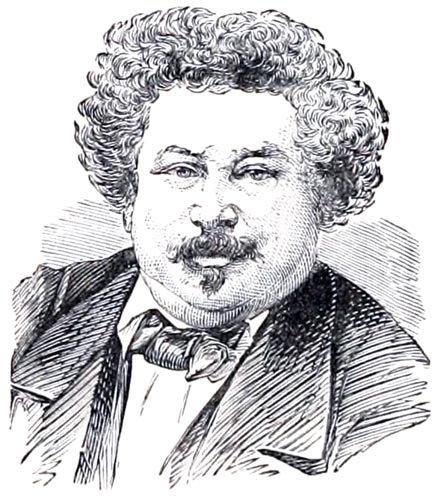
‘Alexandre Dumas’
Hill's Album of Biography and Art - Thomas Edie Hill (p297, 1887)
Internet Archive Book Images
The post brought me a very fine letter from Monsieur de Béranger, in response to the one I wrote to him on leaving Paris: the letter has already been published, with a letter of Monsieur Carrel’s, in The Congress of Verona.
Book XXXV: Chapter 18: Zurich – Constance – Madame Récamier
Geneva, September 1832.
BkXXXV:Chap18:Sec1
In travelling from Lucerne to Constance, you pass through Zurich and Winterthur. Nothing pleased me in Zurich except memories of Lavater and Gessner, the trees on an esplanade that overlooks the lake, the course of the Limath, an old crow and an old elm-tree; I prefer that to all the past history of Zurich, not even taking pleasure in the Battle of Zurich. Napoleon and his generals, with victory after victory, led the Russians to Paris.
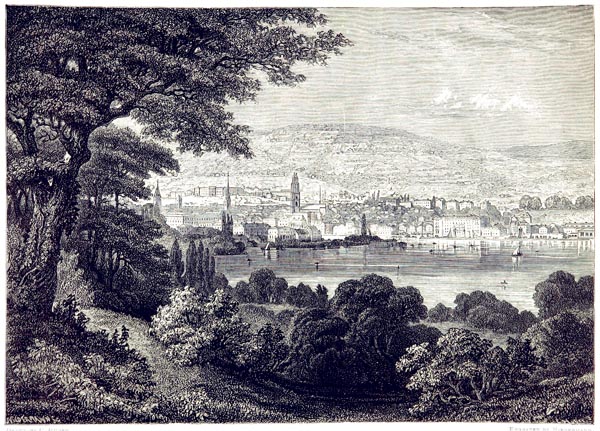
‘Zurich and the Zurichberg’
Switzerland: its Scenery and People - Theodor Gsell Fels (p603, 1881)
The British Library
Winterthur is a new industrial town, or rather a long tidy street. Constance looks as though it belongs to no one; it is open to everyone. I arrived on the 27th of August, without seeing a customs man or a soldier, and without anyone asking for my passport.
Madame Récamier arrived two days ago, on a visit to the Queen of Holland. I was waiting for Madame de Chateaubriand, who was due to join me at Lucerne. I proposed to discover whether it would be preferable to stay in Swabia first, before descending into Italy.
In the dilapidated town of Constance, our inn was very pleasant; they were preparing for a wedding. The day after I arrived, Madame Récamier wanted to join in our hosts’ joy: we embarked on the lake, and crossing the stretch of water from which the Rhine emerges to form a river, we touched at the shores of a park.
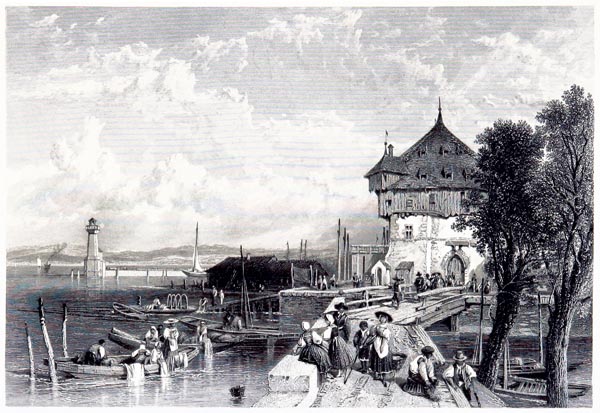
‘The City of Constance as Seen from the Harbour’
The Upper Rhine: the Scenery of its Banks, and the Manners of its People, Vol 02 - Henry Mayhew, Myles Birket Foster (p413, 1858)
The British Library
Having set foot on land, we crossed a belt of willows, on the other side of which we found a sandy path winding among clusters of shrubs, clumps of trees, and grassy carpets. A summer-house rose in the middle of the gardens, and an elegant villa pressed against the forest. I noticed autumn crocuses in the grass, which always make me melancholy with the reminiscences of my many and varied autumns. We walked about at random then sat on a bench beside the water. From the summer-house among the fields drifted the music of harp and horn which died away just as, surprised and delighted, we had begun to listen: it was a scene from a fairy-tale. The harmonies did not recommence, I read Madame Récamier my description of Saint-Gothard; she begged me to write something in her diary already half-filled with details of the death of Jean-Jaques Rousseau. Beneath these last words of the author of Héloïse: ‘Open the window, dear wife, so I may see the sun again’ I traced these words in pencil: What I wished for on Lake Lucerne, I found on Lake Constance, beauty’s charm and intelligence. I do not wish to die like Rousseau; I wish to see the sun for a long while still, if I am allowed to end my life beside you. Let my days expire at your feet, like these waves whose murmur you love. – 28th of August, 1832.
The azure lake flickered through the foliage; on the southern horizon were piled the Alpine summits of the Grisons; a breeze rose and fell among the willows in harmony with the ebb and flow of the waves: we saw no one; we no longer knew where we were.
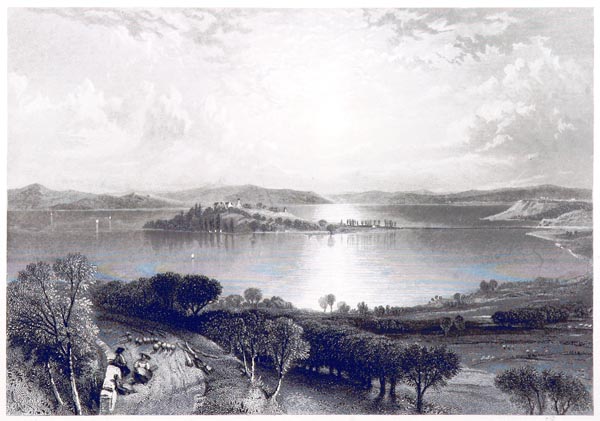
‘The Lake of Constance and the Island of Mainau’
The Upper Rhine: the Scenery of its Banks, and the Manners of its People, Vol 02 - Henry Mayhew, Myles Birket Foster (p382, 1858)
The British Library
Book XXXV: Chapter 19: Madame la Duchesse de Saint-Leu
BkXXXV:Chap19:Sec1
On returning to Constance, we saw Madame la Duchesse de Saint-Leu and her son Louis-Napoléon; they had come to see Madame Récamier. I never knew the Queen of Holland under the Empire; I knew she had shown herself to be generous after my resignation on the death of the Duc d’Enghien, and when I tried to save my cousin Armand; under the Restoration, as Ambassador to Rome, I held only polite relations with Madame la Duchesse de Saint-Leu; unable to visit her myself, I allowed the secretaries and attachés to pay her court freely, and I invited Cardinal Fesch to a diplomatic dinner for the Cardinals. After the final fall of the Restoration, chance led me to exchange several letters with Queen Hortense and Prince Louis. These letters are a singular monument indeed to vanished glory; here they are:
Madame de Saint-Leu, Having Read Monsieur De Chateaubriand’s Last Letter
‘Arenenberg, this 15th of October 1831.
Monsieur de Chateaubriand possesses too much genius not to comprehend the extent of the Emperor Napoleon’s. But his brilliant imagination requires more than admiration: memories of youth, and unfortunate illustriousness, have seduced his heart; he has sacrificed his person and his talent to them, and, like the poet who lends himself to every feeling which animates him, he dons what he loves of those features which inflame his enthusiasm. Ingratitude has not discouraged him, since misfortune was always there summoning him; however his spirit, his reason, his feelings all truly French make him despite himself the protagonist of his party. Of former times he only loves the honour which makes for loyalty, the religion which makes for wisdom, his country’s glory which gives him strength, the freedom of conscience and opinion which gives men’s faculties a noble breadth, the aristocracy of merit which opens careers to all intelligent men, and there is his domain, more than any other. He is then a Liberal, a Napoleonist and even a Republican rather than a Royalist. Also the new France, his new images, know how to appreciate him, while he will never be understood by those he has placed as near-divinities in his heart; and if he is only to sing of misfortune, even if it is more interesting, noble misfortune has become so common in our century, that his brilliant imagination, without an object or true motive, will be extinguished for lack of a fuel elevated enough to inspire his fine talent.
HORTENSE’
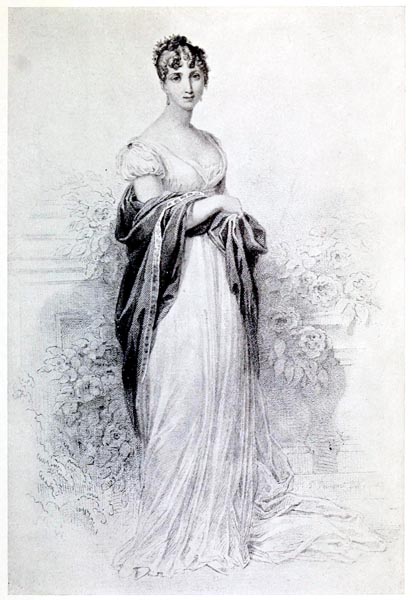
‘Hortense de Beauharnias, Queen of Holland’
The Women Bonapartes: the Mother and Three Sisters of Napoléon I - Hugh Nobel Williams (p168, 1909)
Internet Archive Book Images
After Reading a Note Signed Hortense
‘Monsieur de Chateaubriand is extremely flattered and cannot sufficiently acknowledge the kind sentiments expressed in the first part of the note; in the second is concealed a woman’s and a queen’s seductiveness which might have influenced a self-esteem less disillusioned than that of Monsieur de Chateaubriand.
It is certainly possible today to find an opportunity for disloyalty among so many such noble misfortunes; but at the age Monsieur de Chateaubriand has attained, his homage disdains reverses of only a few years duration: perhaps he should remain attached to his old misfortune, tempted though he might be by younger adversities.
CHATEAUBRIAND.
Paris, this 6th of November 1831.’
‘Arenenberg, the 4th of May 1832.
Monsieur le Vicomte,
I have just read your last pamphlet. How happy the Bourbons are to have a genius such as you to support them! You take up a cause with the same weapons that have been used to destroy it; you find words which stir every French heart. The whole of our nation finds an echo in your soul; thus when you speak of the great man who represented France for twenty years, the nobility of your subject inspires you, your genius embraces it in its entirety, and then your soul, naturally expansive, surrounds the greatest glory with the greatest thoughts.
I too, Monsieur le Vicomte, am enthusiastic for all that does my country honour; that is why, giving way to an impulse, I dare to express the sympathy I feel for one who displays so much patriotism and so much love of freedom. But allow me to say to you that you are the only redoubtable defender of the former royalty; you would make it the national choice if one could believe that it thought as you do; thus, to do the matter justice, it is not enough to declare you of its party, but also to prove that it is of yours.
However, Monsieur le Vicomte, though we differ in our opinions, at least we agree in the wishes we express for France’s good fortune.
Accept, I beg you, etc, etc.
LOUIS-NAPOLÉON BONAPARTE.’
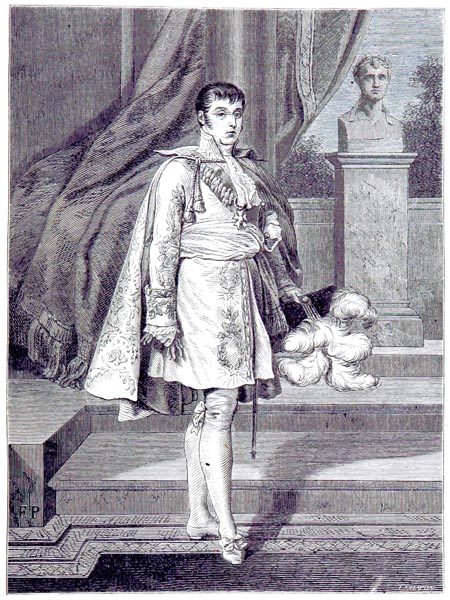
‘Louis Bonaparte’
Histoire du Consulat et de l'Empire, Vol 01 - Louis Adolphe Thiers (p261, 1865)
The British Library
‘Paris, the 19th of May 1832.’
Monsieur le Comte,
One is always ill at ease in responding to praise; when he who gives it with as much spirit as propriety is moreover of a social position to which are attached peerless memories, the embarrassment is redoubled. At least, Sir, we meet in a mutual sympathy; you wish in your youth, as I do in my old age, for France’s honour. Neither of us can fail to die of embarrassment or laughter, on seeing the Centre Ground incarcerated in Ancona by the Pope’s soldiers. Ah, Sir, where is your uncle? To anyone other than you I would say: Where is the teacher of kings, the master of Europe? In defending the cause of the Legitimacy, I am under no illusions; but I think every man esteemed by the public should remain loyal to his oaths: Lord Falkland, a friend of liberty and enemy of the Court, went to his death at Newbury as a member of Charles I’s army. You will live, Monsieur le Comte, to see your country free and happy; you will traverse the ruins among which I shall rest, since I am myself a portion of those ruins.
I was flattered momentarily with the hope of paying my respectful homage this summer at the feet of Madame la Duchesse de Saint-Leu: fate, accustomed to foil my plans, has deceived me on this occasion also. I would have been happy to thank you in person for your obliging letter; we might have spoken of great glory, and the future of France, two things, Monsieur le Comte, close to your heart.
CHATEAUBRIAND.’
Did the Bourbons ever write letters like those I have just reproduced? Did they ever consider I might be more than a versifier or a political columnist?
When, as a small boy, I wandered a companion of goatherds on the heaths of Combourg, would I have believed that the day would come when I would pace between two of the greatest powers on earth, defeated powers, giving one arm to the race of Saint-Louis, the other to that of Napoleon; opposing greatnesses leaning equally, in the misfortune in which they join, on a feeble but loyal man, formerly hated by the usurper and scorned by the Legitimacy.
Madame Récamier went to stay at Wolfberg, a château inhabited by Madame Parquin, in the neighbourhood of Arenenberg, the residence of the Duchesse de Saint-Leu; I remained at Constance for two days. I saw everything one can see there: the market-hall or public loft that they have baptised the Council Chamber, the so-called statue of Huss, the caricature paintings, the place where they say Jerome of Prague and John Huss were burned at the stake; in short, all the usual abominations of history and society.
The Rhine, on leaving the lake, announces itself in kingly fashion; yet it has failed to protect Constance, which, if I am not mistaken, was sacked by Attila, besieged by the Hungarians and the Swedes and twice taken by the French: everywhere a river leaves a lake there is a town.
Constance is the Saint-Germain of Germany; the old members of the old society have retired there. When I knocked on a door, enquiring for an apartment for Madame de Chateaubriand, I met some canoness, an elderly daughter; some prince of ancient race, an elector in his old age and on half-pay; all this in keeping with the town’s abandoned bell-towers and deserted convents. Condé’s army fought gloriously beneath the walls of Constance, and seems to have established its military hospital in the town. I had the misfortune to meet a veteran émigré; he did me the honour of having known me previously; he had more years than hair; his words had no endings; he could not hold back the years or let them go.
Book XXXV: Chapter 20: Arenenberg – Return to Geneva
BkXXXV:Chap20:Sec1
On the 29th of August I went to dine at Arenenberg.
Arenenberg is situated on a kind of promontory, in a range of steep hills. The Queen of Holland, whom the sword made and the sword un-made, built the château, or, if one prefers, chalet of Arenenberg. It enjoys an extensive, but melancholy, prospect. The view overlooks the lower Lake of Constance, which is merely an expansion of the Rhine over flooded meadows. On the far side of the lake you can see sombre woods, remnants of the Black Forest, and a few white birds fluttering beneath a grey sky, buffeted by an icy wind. There, having been seated on a throne, Queen Hortense came to perch on a rock; below is an island in the lake where, they say, the tomb of Charles the Fat was discovered, and where canaries, set free and vainly seeking the sun of the Canaries, are now dying. Madame la Duchesse de Saint-Leu was better off in Rome: she has not yet descended relative to her birth and early years; on the contrary she has climbed; her abasement is only in relation to an accident of fate; it was not one of those falls like that of Madame la Dauphine, fallen from the height of the centuries.
Madame la Duchesse de Saint-Leu’s companions were her son, Madame Salvage, and Madame Parquin. The guests were Madame Récamier, Monsieur Vieillard and I. Madame la Duchesse de Saint-Leu handled her difficult position as queen and young Beauharnais lady very well.
After dinner, she sat down at her piano with Monsieur Cottereau, a tall and handsome young painter with a moustache, a straw hat, a smock, and a shirt open at the neck, a bizarre costume something between one of Henry III’s ‘darlings’ and a Calabrian shepherd, without affectation, but with that unfortunate manner of the studio somewhere between informal, droll, original, and affected. He hunted, he painted, he sang, he loved, he laughed, was witty, and noisy.
Prince Louis lived in a separate chalet, where I saw weapons, and topographic and military maps; hobbies which made one think, as if at random, of the conqueror’s race without naming him: Prince Louis is an educated young man, full of honour and serious by nature.
Madame la Duchesse de Saint-Leu read me several fragments of her memoirs; she showed me an office filled with Bonaparte’s spoils. I asked myself why this room left me cold; why the little hat which made the bourgeois of Paris happy, that belt, that uniform worn in such and such a battle found me so indifferent; I was no more moved than I am by the sight of generals’ uniforms hanging in the second-hand clothes shops on the Rue de Bac; I was much more disturbed recounting Napoleon’s death on St Helena. The reason is that Napoleon was our contemporary; we all saw and knew him: the man in our memory works against the hero too close still to his glory. In two thousand years it will be another thing. The very form and content of those relics detracts from their effect: we view with respectful curiosity the Macedonian’s breastplate whose ornamentation traces a plan of Alexandria, but what can we do with a worn-out morning-coat? I would prefer the Corsican mountaineer’s jacket that Napoleon had to wear as a child: without us realising it, artistic feeling exercises a great sway over our ideas.
That Madame de Saint-Leu is enthusiastic about this trivia is not surprising; but other visitors need to remember the royal mantles torn by Napoleonic claws. The centuries alone give Alexander’s sweat its amber perfume. Let us wait: for a conqueror, only his sword need be shown.
Bonaparte’s family cannot persuade themselves that they are nobodies. The Bonapartes lack a pedigree; the Bourbons a man: there would be more chance of a Restoration of the latter, since a man might suddenly arise but no one can create a pedigree. Everything ended for Napoleon’s family with the man himself: they can only inherit his fame. The dynasty of Saint Louis was so strengthened by its long history that in falling it tore up a part of the foundations of society with its roots.
I am unable to say why the Imperial world seems to me void of manners, physiognomy, style, and customs; yet is of a different age to the world of the Legitimacy: the latter possesses the decrepitude that time brings; it is blind and deaf, it is weak, ugly and querulous, but it displays its natural air and its crutches suit its age. Imperialists, on the contrary, give a false show of youth; they wish to appear sprightly, but occupy the Invalides; they are not ancient like the Legitimists, they are only old like a spent fashion: they have the look of those divinities of the Opera who have descended to their chariots of gilded cardboard; military suppliers bankrupted by a poor speculation or a battle lost; ruined gamblers who still retain some remains of their borrowed magnificence, bracelets, chains, seals, rings, faded velvet, tired satins, and seamless Point d’Angleterre lace.
Returning to Wolfberg with Madame Récamier, I left for the night: the weather was dark and rainy; the wind sighed in the trees and the owls hooted: a truly Germanic scene.
Madame de Chateaubriand soon arrived in Lucerne: the dampness of the villa worried her, and, Lugano being too dear, we decided on Geneva. We made our way via Sempach; the lake holds a memory of a battle that assured Swiss liberation at a time when the nations this side of the Alps had lost their freedom. Beyond Sempach, we passed the Abbey of Saint-Urbain, dilapidated like all the monuments of Christianity. It is situated in a gloomy place, at the edge of a heath leading to woodland: if I had been alone and free, I would have asked the monks for some hole in their walls, to finish my Memoirs, like an owl; then I might have gone to end my days beneath the lovely relaxing sun of Naples or Palermo: but beautiful countries and the spring have become injurious to me, disastrous, sources of regret.
When we arrived in Bern, we were told that there was a major revolt going on in the city; I looked carefully, the streets were deserted, silence reigned, the terrible revolution had been completed without a word, to the peaceful smoking of pipes, in the depths of some little inn.
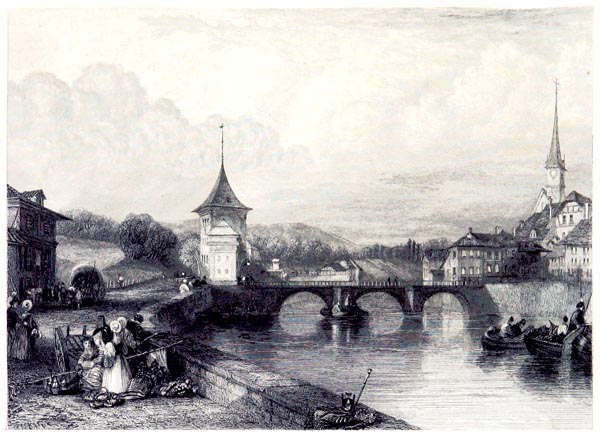
‘Pont et Entree de Berne’
Berne - Philipp Albrecht Stapfer (p11, 1835)
The British Library
Madame Récamier lost no time in joining us in Geneva.
Book XXXV: Chapter 21: Coppet – Madame de Staël’s tomb
Geneva, October 1832.
BkXXXV:Chap21:Sec1
I have started to set to work seriously once more; I write in the mornings and walk in the evenings. Yesterday I visited Coppet. The château was closed; they opened the doors for me; I wandered through the empty rooms. My companion on this pilgrimage recognised all the places where she still imagined she saw her friend, sitting at the piano, flitting in and out, chatting on the terrace which borders the gallery; Madame Récamier saw the room she had occupied once more; lost days appeared before her: it was almost a repetition of the scene I depicted in René: ‘I traversed the sonorous apartments where only the sound of my steps was heard. Everywhere the rooms were untended, and spiders spun their webs over the abandoned couches. How sweet but how fleeting are the moments brothers and sisters spend together in their youth, gathered beneath the wings of their aged parents! The family of man endures but a day; a breath from God disperses it like smoke. The son has scarcely come to know the father, the father his son, the brother his sister, the sister her brother! The oak tree sees its fruit germinate around it, it is not thus with the children of men!’
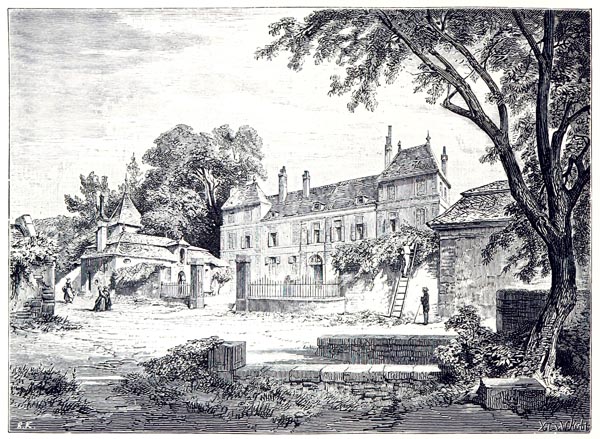
‘Château of Coppet - the Residence of Necker and of Madame de Staël’
Switzerland: its Scenery and People - Theodor Gsell Fels (p46, 1881)
The British Library
I recall too what I said in my Memoirs concerning my last visit to Combourg, on leaving for America. We occupy two diverse worlds, but bound by a secret empathy, Madame Récamier and I. Alas! These isolated worlds: each of us bears them within us; for who are those who have lived so long together they do not possess different memories? From the château we entered the park; autumn was in its first blush and a few leaves had fallen; the wind abated by degrees and allowed the sound of a mill-stream to be heard. Following the paths she used to trace with Madame de Stael, Madame Récamier wished to salute her grave. Some distance from the park is a copse of very tall varied trees, surrounded by a damp and broken wall. This copse resembles those clumps of woodland in the midst of plains that hunters call coverts; into them death drives its prey and surrounds its victims.
A tomb had been built in these woods to receive the remains of Monsieur and Madame Necker, and Madame de Staël; when the latter had been placed in the crypt, the door had been sealed. Auguste de Stael’s son lies outside it, and Auguste himself, dying shortly before his child, was placed beneath a stone at his parent’s feet. On the stone are engraved these words from Scripture: ‘Why seek ye the living among the dead?’ I did not enter the woods; Madame Récamier alone had obtained permission to penetrate there. I remained seated on a bench before the surrounding wall, I turned my back on France and my gaze was fixed, now on the summit of Mont Blanc, now on Lake Geneva: golden clouds covered the horizon behind the sombre line of the Jura; one might have likened it to a glory rising over a long coffin. I could see Lord Byron’s house on the far side of the lake, its rooftop lit by a ray of the setting sun; Rousseau was no longer there to admire the spectacle, while Voltaire, also gone, never cared for it. It was at the foot of Madame de Stael’s tomb that so many of the illustrious dead, absent from this very shore, presented themselves to my memory: they seemed to come seeking their peer to fly to heaven with her, forming her cortege through the night. At that moment, Madame Récamier, pale and in tears, emerged from the funereal grove, almost like a shade herself. If I have ever felt at once the vanity and the reality of life and glory, it was at the entrance to those woods, silent, dark, anonymous, where she who possessed so much brilliance and fame slept, and in seeing what it is to be truly loved.
Book XXXV: Chapter 22: A walk
BkXXXV:Chap22:Sec1
This very evening, on the day following my devotions to the dead at Coppet, weary of the lake shore, I went, with Madame de Récamier as ever, to seek the less frequented walks. We discovered a narrow gorge, downstream along the Rhône, where the river seethed beneath a series of water-mills, between rocky cliffs bordering meadows. One of those meadows extends to the foot of a hill on which a house is situated, among a grove of trees.
While talking, we several times ascended and descended that narrow verge of grass, separating the noisy river from the silent bank: how many people are there one can weary with what one has been, and lead back along the track of one’s days? We spoke of those times, always painful and always regretted, when passion is the joy and martyrdom of youth. Now I write this page at midnight, while all is at rest around me, and through my window I can see a scattering of stars shining above the Alps.
Madame Récamier is to leave us, she will return in the spring, and I will spend the winter evoking my vanished hours forcing them to appear before the tribunal of my reason. I do not know whether I am sufficiently impartial or whether the judge will show too much indulgence to the guilty. I will spend the summer in Jean-Jacques’ country. God does not wish me to conquer my dreamer’s malady! And then, when autumn returns, we will go to Italy: Italiam! It is my eternal refrain.
Book XXXV: Chapter 23: A letter to Prince Louis-Napoleon
BkXXXV:Chap23:Sec1
Prince Louis-Napoleon having given me his pamphlet entitled Rêveries politiques, I addressed this letter to him:
‘Geneva, October 1832.
Prince,
I have read with care the little pamphlet you have been good enough to entrust to me. I have put in writing, as you wished, a few thoughts which arose naturally from yours, which I have already submitted to your judgement. You know, Prince, that my young king is in Scotland, that as long as he is alive there can be no other king for me in France than he; but if God, in his impenetrable wisdom, has rejected the line of Saint-Louis, if the habits of our country were to allow the possibility of a Republican state within her borders, there is no name which better befits the glory of France than your own.
I am etc, etc.
CHATEAUBRIAND.’
Book XXXV: Chapter 24: A circular to the editors-in-chief of the newspapers – Letters to the Minister of Justice, the President of the Council, and Madame la Duchesse de Berry – I write my Memoir on the Princess’ captivity
Paris, Rue d’Enfer, January 1833.
BkXXXV:Chap24:Sec1
I often dreamt of that impending future I had created for myself and which I believed I would achieve. At the fall of day, I would wander the windings of the Arve, beneath the flanks of the Salève. One evening, I met Monsieur Berryer; he was returning from Lausanne and told me of the arrest of Madame la Duchesse de Berry; he knew no details. My plans for repose were yet again overturned. When Henri V’s mother thought she had achieved success, she gave me leave of absence; her misfortune tore up that previous document, and summoned me to her defence. I immediately left Geneva having written to the Ministers. Reaching the Rue d’Enfer, I addressed the following circular to the editors-in-chief of the newspapers:
‘Sir,
Having arrived in Paris on the 17th of this month (November 1832), I wrote on the 18th to the Minister of Justice to ask if the letter which I had the honour to have sent him from Geneva, on the 12th, on behalf of Madame la Duchesse de Berry, had reached him and if he would have the goodness to send it on to Madame.
I sought from the Keeper of the Seals, at the same time, the necessary authorisation to visit the Princess at Blaye.
The Keeper of the Seals kindly replied to me, on the 19th, that he had sent my letters to the President of the Council and that it was he whom I must address. I therefore wrote on the 20th to the Minister of War. Today, the 22nd, I received his reply of the 21st: he regrets the necessity of having to inform me that the government has not judged itself able to accede to my requests. That decision has put an end to my approaches to the authorities.
I have never had the pretension, Sir, to believe myself capable in isolation of defending the cause of the unfortunate in France. My plan, if I had been granted permission to reach the feet of the august prisoner, would have been to suggest to her on this occasion the formation of a council of more brilliant men than I. Beyond the honourable and distinguished names already offered, I would have taken the liberty of indicating for Madame’s endorsement, Monsieur le Marquis de Pastoret, Monsieur Lainé, Monsieur Villèle etc.
Now, Sir, having been repulsed by officialdom, I fall back upon my rights as a private citizen. My Memoirs of the life and death of Monsieur le Duc de Berry, wrapped in the hair of the widow who is today a captive, rest beside the heart which Louvel rendered more like that of Henri IV. I have not forgotten that signal honour, for which the present moment demands I account, and which makes me feel the whole weight of my responsibility.
I am, Sir, etc, etc.
CHATEAUBRIAND.’
While I was writing this circular for the newspapers, I found the means to send this letter to Madame la Duchesse de Berry:
‘Paris, this 23rd of November 1832.
Madame,
I had the honour to send you a previous letter, addressed from Geneva, and dated the 12th of this month. That letter, in which I begged you to do me the honour of selecting me as one of your defenders, has been printed in the newspapers.
Your Royal Highness’ cause may be taken up individually by all those who, without being so authorised, have useful truths to impart; but if Madame desires someone to work in her own name, it is not one man, but a group of political and legal minds that must be charged with that great matter. In that case, I ask Madame to add to myself (and whomever she has already chosen) Monsieur le Comte de Pastoret, Monsieur Hyde de Neuville, Monsieur de Villèle, Monsieur Lainé, Monsieur Royer-Collard, Monsieur Pardessus, Monsieur Mandaroux-Vertamy, and Monsieur de Vaufreland.
I also consider Madame that one could summon to such a council several men of significant talent with opinions contrary to ours; but perhaps that would be to place them in false position, and oblige them to sacrifice honour and principle, which elevated minds and honest consciences will not agree to do.
CHATEAUBRIAND.’
Being an old soldier, used to discipline, I therefore hastened to join the ranks and march to my officers’ orders: driven by the wishes of the powerful to duelling, I accepted the challenge. I barely paused, in coming from the husband’s grave, before fighting in front of the widow’s prison.
Even supposing I was isolated, and had misunderstood what was appropriate for France, I was nevertheless on the path of honour. Now, it is valuable to mankind for a man to sacrifice himself for his conscience; it is fine for him to consent to destroy himself in order to remain true to principles of which he is convinced and which appertain to whatever is noble in our nature: such men deceived are the necessary opponents of brute fact, victims charged with pronouncing a veto on behalf of the oppressed against the triumph of force. Men praise the Poles; is their devotion anything other than sacrifice? They can achieve nothing; they could never have achieved anything; in my adversarys’ minds, is such loyalty worthless to the human race?
I prefer, they say, one family to my own country: no, I prefer faithfulness to oath-breaking, the moral world to material society; that is all; as to that family, I dedicate myself to it in the sole belief that it has been of vital assistance to France; I associate its prosperity with that of the country, and when I deplore the misfortunes of one, I deplore the disasters that strike the other: vanquished, I pursue my duty, while the conquerors pursue their interests. I am endeavouring to retire from the world with my self-esteem intact; in solitude, one must be careful whom one chooses for company.
Book XXXV: Chapter 25: Extract from my Memoir on the Captivity of Madame la Duchesse de Berry
Paris, Rue d’Enfer.
BkXXXV:Chap25:Sec1
In France, the land of vanity, as soon as an opportunity presents itself to make a noise, a crowd of people seize on it: some make a stir from kindness of heart, others because of the belief they have in their own merit. I therefore had plenty of competition; like me, they appealed to Madame la Duchesse de Berry, for the honour of defending her. At least my presumption in offering myself as the Princess’ champion was somewhat justified by my previous services: if I could not throw Brennus’ sword onto the scale, I could place my name there: unimportant as it is, it had once won some small victories for the monarchy. I opened my Memoir on the Captivity of the Duchesse de Berry with a series of thoughts with which I was greatly taken; I have often reproduced them, and I shall likely do so again.
‘One never ceases to be astonished,’ I said, ‘at the course of events, one always imagines one has reached the end; but always the revolution recommences. Those who have spent forty years marching in order to arrive at their goal can only groan; they thought they might be able to rest for a few hours on the edge of the tomb: a vain hope! Time prods those panting voyagers and forces them onwards. Suddenly, while they are journeying, the old monarchy falls at their feet! Barely escaping from the successive collapses, they are obliged to traverse anew the dust and rubble. What century will see an end to it?
Providence wished the passing generations, destined to these unmemorable days, to be of little account, so the damage would be of little account. Do we not see too how all fails, how all comes to naught, how no one can be themselves or embrace their destiny completely, how no event delivers what it contains or ought to deliver. Will the superior men of this age who die, extinguished, have successors? The ruins of Palmyra vanish in the sands.’
Passing from this general observation to specifics, I show, in my argument, that one might act in an arbitrary manner towards Madam la Duchesse de Berry by considering her a prisoner of the police, of war, or of State, or in demanding a bill of attainder from the Chambers; that one might submit her to the judgement of the law by applying Briqueville’s law of exception to her, or the code of common law; or that one might regard her person as sacred and inviolable.
The Ministers maintained the first opinion, the men of July the second, the Royalists the third.
I ran through these various suppositions: I proved that if Madame la Duchesse de Berry had entered France, she had only been enticed there by listening to opinions that demanded a different Present, and called for a different Future.
Disloyal to its popular origins, the revolution emerging from the July Days repudiated glory and courted shame. Other than in those hearts worthy of giving it shelter, liberty, which became an object of derision among those who made liberty their rallying cry, liberty which those jugglers dismissed with a blow of the foot, liberty bruised then strangled when the tourniquet of the laws of exception had been applied, will transform the revolution of 1830, by its annihilation, into a cynical deception.
Given that, and in order to deliver us, Madame la Duchesse de Berry arrived. Fate betrayed her; Deutz sold her, Thiers bought her. If there was no wish to take police measures against her it only remained to bring her before the assize court. I supposed this to be so, and brought the Princess’ defence counsel on stage; then having made the speech for the defence, I addressed myself to the prosecution:
‘Prosecuting Counsel, arise:
You will establish, my learned friend, that Caroline-Ferdinande of Sicily, Berry’s widow, niece of the late Marie-Antoinette of Austria, Capet’s widow, is guilty of complaint against a man renowned as the uncle and tutor of an orphan named Henri; the said uncle and tutor being, according to the calumnies of the accused, a usurper of the crown of his pupil, which pupil impudently claims to have been king since the abdication of the former Charles X and of the ex-Dauphin, until the election of the King of the French.
In support of your case, let the judges first call Louis-Phillippe as a witness for the prosecution or the defence, if he prefers not to give an opinion as a relative. Then let the judges confront the descendant of the arch-traitor with the accused; let the Iscariot into whom Satan entered, intravit Satanas in Judam, speak of the money he received for the sale, etc, etc.
Then, according to the evidence as to place, show that the accused was for six hours in a fiery Gehenna in too narrow a space, where four persons could barely breathe who spoke in a manner injurious to the victim saying they would torment her like Saint Lawrence. Now, that Caroline-Ferdinande, being pressed by these accomplices against the fire-back, her clothes must twice have caught fire, and at each blow the police dealt the burning hearth from outside, the commotion would have been felt in the accused person’s heart and would have made her vomit drops of blood.
Then, in the presence of Christ’s image, the burnt robe shall be deposited on the desk as evidence: since in these Judas markets there is always a robe cast to fate.’
Madame la Duchesse de Berry has been set at liberty by an arbitrary act of power, now they consider her to have been dishonoured. The picture I painted of the proceedings made Philippe conscious of the odium of a public trial, and made him decide on an act of mercy towards one he had thought to torment: the pagans, in the reign of Severus, threw a recently freed young Christian girl to the wild beasts. My pamphlet, of which only a few paragraphs now remain, achieved a historically important result.
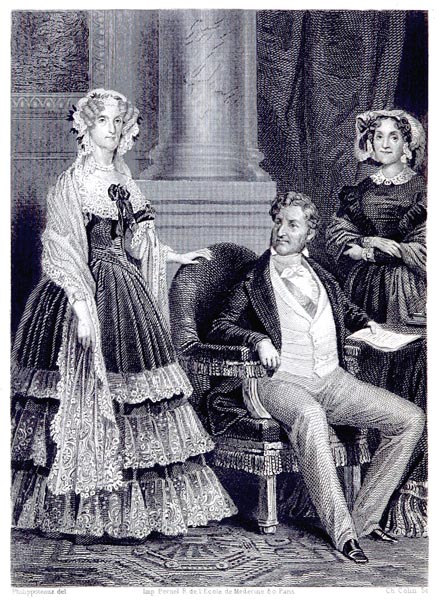
‘Louis Philippe’
Le Dernier Roi - Alexandre Dumas (p410, 1854)
The British Library
I am still moved when copying the speech which terminates my effort; it is, I agree, a foolish waste of tears.
‘Illustrious captive of Blaye, Madame, may your historic presence on a soil which has known much heroism lead France to repeat to you what my political independence has earned me the right to say to you: Madame, your son is my king! If Providence still grants me a few moments, shall I see your triumphs, after having had the honour to embrace your adversity? Shall I receive that reward for my faith? At the hour of your happy return, I would go joyfully to end in retirement the days I began in exile. Alas! I am sorry to be unable to do anything for your present fate! My words prove useless against the walls of your prison: the sound of the wind, waves and men, at the foot of your solitary fortress, will not even allow these last accents of a faithful voice to rise to you.’
Book XXXV: Chapter 26: My trial
Paris, March 1833.
BkXXXV:Chap26:Sec1
Various newspapers, having repeated the phrase: Madame, your son is my king, were brought before the courts for Press offences; I found myself involved in the legal proceedings. This time I could not deny the competence of the judges; I had to try and save, by my presence, the men attacked on my behalf; it was a matter of honour that I must answer to my works.
Moreover, on the eve of my summons to the tribunal, the Moniteur published the Duchesse de Berry’s declaration of her secret marriage; if I had been absent, they would have thought the Royalist party had retreated, that it had abandoned misfortune and blushed for the Princess whose heroism it had celebrated.
There was no lack of timid counsellors who told me: ‘Do not go. You will be embarrassed no end by your phrase: Madame, your son is my king. –
I will shout it the more loudly,’ I replied. I entered the very room where the Revolutionary Tribunal had once been installed which Marie-Antoinette had appeared before, and where my brother had been condemned. The July Revolution had removed the crucifix whose presence, while consoling the innocent, had made the judge tremble.
My appearance before the judges had a happy result, it offset for a moment the announcement in the Moniteur, and kept Henri V’s mother on the heights where her courageous attempt had placed her; doubt set in when people saw that the Royalist party dared to brave the outcome and did not consider itself defeated.

‘La Cour d'Assises’
Les Français Peints par Eux-Mêmes (p34, 1853)
Internet Archive Book Images
I did not wish for a lawyer, but Monsieur Ledru, who was attached to me during my detention, wished to speak: he became confused and upset me so much Monsieur Berryer, who was pleading on behalf of the Quotidienne, indirectly took up my defence. In the summing up, I called the jury the universal peerage which contributed not a little to our complete acquittal.
Nothing remarkable distinguished this trial in the dreadful room that had echoed to the voices of Fouquier-Tinville and Danton; there was only the amusement of Monsieur Persil’s arguments; wishing to prove my culpability, he cited this phrase from my pamphlet: It is difficult to crush what crawls beneath one’s feet, and cried out: ‘Gentlemen, feel the scorn which emanates from that phrase, it is difficult to crush what crawls beneath one’s feet?’ and he made a movement like a man who crushes something underfoot. He continued, triumphantly: the laughter of the audience continued also. This fine gentleman saw neither the audience’s delight in the unfortunate phrase, nor how perfectly ridiculous he appeared stamping in his black robe as if he were dancing, his face pale with inspiration and his eyes wild with eloquence.
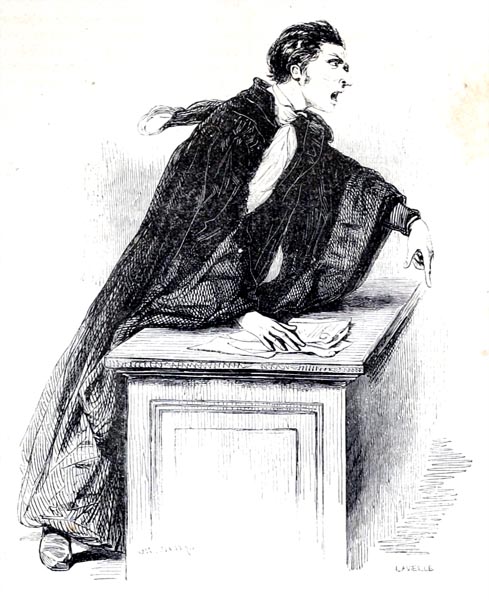
‘La Cour d'Assises’
Les Français Peints par Eux-Mêmes (p30, 1853)
Internet Archive Book Images
When the jury returned and pronounced the verdict of not guilty, applause broke out, I was surrounded by a throng of young men who had donned lawyer’s robes to gain entry: Monsieur Carrel was there.
The crowd grew on my emergence: there was a scuffle in the courtyard of the palace between my escort and the police. I finally reached home, with great difficulty, in the midst of the crowd which followed my cab, shouting: ‘Long Live, Chateaubriand!’
At another time this acquittal would have been very significant; to declare that it was not a crime to say to the Duchesse de Berry: Madame, your son is my king was to condemn the July Revolution; but today that decision signifies nothing, because there is no conviction or durability in anything. In twenty-four hours all changes; I would be condemned tomorrow on the evidence with which I have been acquitted today.
I went to leave my card at the jurors’ houses and notably that of Monsieur Chevet, one of the members of the universal peerage.
It was easier for an honest citizen in all conscience to make a decision in my favour than it was to find the money in my pocket to add to the happiness of my acquittal the pleasure of providing my judge with a good dinner: Monsieur Chevet had pronounced more fairly on the Legitimacy, the Usurpation, and the author of Le Génie du Christianisme than most of the publicists and censors.
Book XXXV: Chapter 27: Popularity
Paris, April 1833.
BkXXXV:Chap27:Sec1
My Memoir on the Captivity of Madame la Duchesse de Berry made me extremely popular with the Royalist party. Deputations and letters arrived from all sides. From the north and south of France I received petitions covered with thousands of signatures. They all demanded in referring to my pamphlet that Madame la Duchesse de Berry should be set at liberty. Five hundred young Parisians came to compliment me, not without a great commotion among the police: I received a ruby-red goblet with this inscription: To Chateaubriand from the loyal citizens of the Villeneuvois (Lot-et-Garonne). A town in the Midi sent me some very good wine to charge the goblet with, but I do not drink. Finally, Legitimist France took for its motto the words: ‘MADAME, YOUR SON IS MY KING!’ and several journalists adopted it as their epigraph; it was engraved on pendants and rings. I was the first to have confronted the Usurpation with a truth that no one dared say, and strangely I believed in the return of Henri V less than the most miserable Centrist or the most violent Republican.
Moreover I do not understand the word Usurper in the narrow sense that the Royalist party gives to it; there may be much to say in regard to this word, as there is in regard to the word Legitimacy: but in reality there is usurpation and a worse sort of usurpation, that of a tutor who robs his pupil and proscribes an orphan. All the grand phrases about ‘the need to save the country’ are pretexts which furnish ambition with an immoral politics. No one, in truth, should regard the cowardice of your usurpation as an example of your virtue! Are you, by any chance, Brutus sacrificing his sons to Roman greatness?
I can compare, in my own life, literary fame with popularity; the first pleased me for a few hours, but that love of fame soon passes. As for popularity, it found me indifferent, since during the Revolution I saw far too many men surrounded by the masses who having raised them on a shield dropped them in the gutter. A democrat by nature, an aristocrat by habit, I would willingly abandon my fortune and my life for the people, so long as I had little to do with the crowd. However, I was extremely touched by the action of the young people of July in carrying me in triumph to the Chamber of Peers; it was not that they carried me aloft as their leader or because I thought as they did; they were merely rendering justice to an enemy; they recognised in me a man of liberty and honour; and that generosity of spirit moved me. But the other kind of popularity which I happened to acquire among my own party caused me no emotion; between the Royalists and I there is a degree of coolness: we desire the same king; apart from that, most of our wishes are contrary.
End of Book XXXV